European Court of Auditors 2017 Activity Report

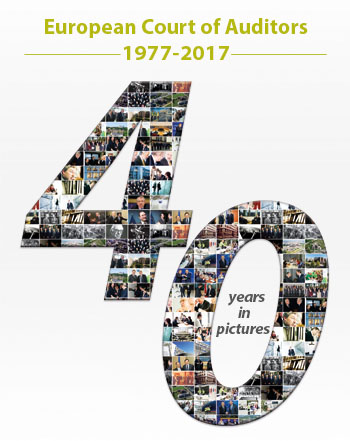
There is nothing quite like pictures to bring 40 years to life. These photographs above showcase the day-to-day working life of the hundreds of staff that have served our institution over the years. A selection of these photographs has been posted on our website (eca.europa.eu) and social media (@EUauditors) throughout 2017.
European Court of Auditors
Who we are
The European Court of Auditors (ECA) is the EU’s external auditor.
We are one of the seven institutions of the Union. Our College is composed of 28 Members, one from every EU Member State. We employ around 900 audit and administrative staff of all EU nationalities.
Our institution was established in 1977. We are based in Luxembourg.
What we do
We check that the EU keeps good accounts and correctly applies its financial rules, and that EU policies and programmes deliver value for money.
Through our work we contribute to improving the EU’s financial management and promote accountability and transparency. We warn of risks, provide assurance, indicate shortcomings and successes and offer guidance to EU policymakers and legislators.
We present our observations and recommendations to the European Parliament, the Council of the EU, national parliaments and the general public.
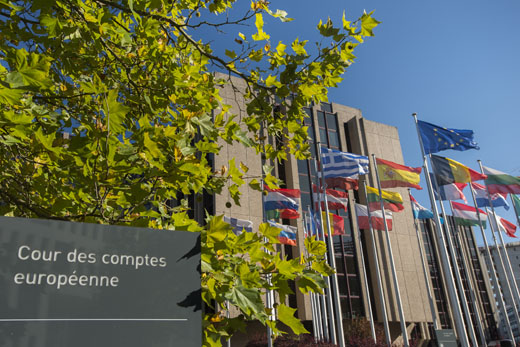
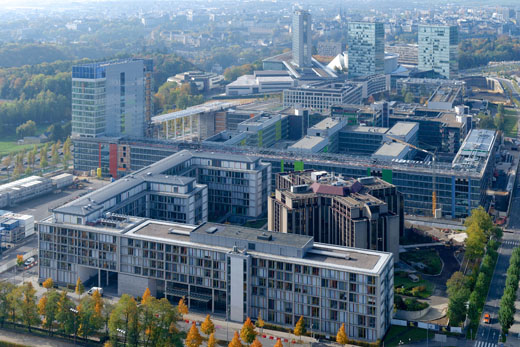
ECA premises on the Kirchberg plateau in Luxembourg, 2017.
President’s foreword
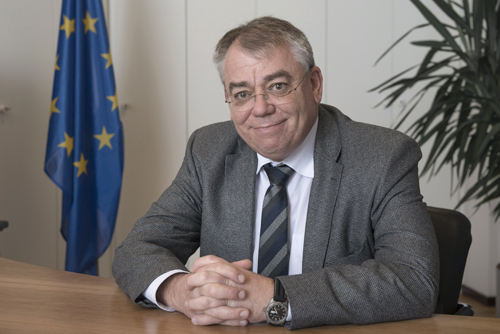
Dear reader,
The European Court of Auditors started operations in 1977. 40 years later, we can look back on the many successful contributions we have made to public accountability and the EU’s financial management.
In October 2017, this anniversary was marked with an official ceremony in the presence of their Royal Highnesses the Grand Duke and Grand Duchess of Luxembourg, Kersti Kaljulaid, President of Estonia, Antonio Tajani, President of the European Parliament, and Jean-Claude Juncker, President of the European Commission. Their attendance was a strong testament to our role as the European Union’s ‘financial conscience’.
But during the year we also looked ahead. We discussed and agreed our strategy for the three remaining years of the current multiannual financial framework, up to the end of 2020. Our citizens require clear, reliable and accessible information to maintain trust in the EU and our institutions. People need to be able to see that the EU acts with integrity, applies the rule of law, spends public money carefully, is clear about its policy objectives and achieves the results it has promised. We, as the Union’s external auditor, are well placed to verify this and report accordingly.
Throughout the year, we issued special reports on a wide range of EU policies and programmes as well as review-based publications such as landscape reviews and rapid case reviews. In addition, we prepared several opinions on legislative proposals and, as we do every year, our annual reports on the EU budget and the European Development Funds, as well as on EU agencies and many other Union bodies.
In this report, you will find a comprehensive account of our activities in 2017 and key information on our organisation, budget and staff.
I hope you enjoy reading it.
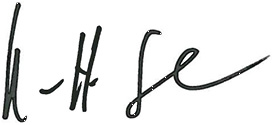
Klaus-Heiner Lehne
President
2017 at a glance
Our activities
- Twenty-eight special reports examining the effectiveness and added value of EU policies and programmes in areas such as youth unemployment, environment, migration and the banking union;
- A landscape review of EU action on energy and climate change and a rapid case review of the EU institutions’ staff reduction;
- Five opinions on proposed new or updated EU laws with significant financial management implications, including one on the Financial Regulation for the EU budget and one on the funding of European political parties;
- Annual reports on the implementation of the EU budget and the European Development Funds, including the 2016 EU audit in brief summary report;
- Fifty-five specific annual reports on the accounts of the EU’s various agencies, bodies and joint undertakings located across the Union, including two summary reports; and
- Meetings, seminars and conferences with our institutional stakeholders and peers, such as the EU Contact Committee meeting of the heads of EU Member States’ supreme audit institutions, as well as conferences on youth employment and energy, climate change and impact assessment.
Our management
- We welcomed two new Members to our institution: Juhan Parts (Estonia) on 1 January 2017 and Ildikó Gáll-Pelcz (Hungary) on 1 September 2017;
- We issued a new multi-year strategy to guide our work and management from 2018 through 2020;
- We reviewed our work programming to ensure a more strategic, consistent and institution-wide approach to planning our audit priorities;
- We reviewed our risk management policy and reinforced our financial procedures;
- We continued to reduce our staff posts, as agreed between the EU institutions, while implementing equal opportunities policy in recruitment and human resources management;
- We obtained environmental certifications such as EMAS and ISO 14001:2015 for our environmental management system.
Our activities
Auditing
We carry out different types of audits across the different areas of the EU budget:
- Performance audits on the effectiveness, efficiency and economy of EU policies and programmes. These value-for-money audits focus on specific management or budgetary topics: we select them based on criteria such as public interest, potential for improvement, risk of poor performance or risk of irregularity; and
- Financial and compliance audits on the reliability of annual accounts and the legality and regularity of underlying transactions (most notably the statement of assurance), as well as assessments of whether the systems or transactions in specific budgetary areas comply with the rules and regulations governing them.
Based on the evidence we collect in performing our audit work, our reports provide clear conclusions on the extent to which the EU’s policy objectives are met and on the state of EU budget accounting and financial management. This helps us to give practical and cost-effective recommendations.
Audit visits in 2017
We undertake most of the audit work at our premises in Luxembourg. At the same time, during 2017, our auditors also made a large number of visits to the other EU institutions, agencies and bodies, or EU delegations, the national, regional and local authorities in the Member States, and international organisations such as the United Nations that are involved in the processing of EU funds. We also check recipients of EU funds on the spot both within the Union and beyond its borders. Through these checks, we obtain direct audit evidence from those involved in the management of EU policies and programmes and in the collection and payment of EU funds, as well as from the beneficiaries who received them.
The frequency and intensity of our audit work in individual Member States and beneficiary countries depends on the type of audits we carry out. In 2017, our auditors spent 3 670 days auditing on the spot (4 246 in 2016) — in Member States and outside the EU.
Our audit teams generally comprise two or three auditors, while our audit visits range in length from a few days to a couple of weeks. Our on-the-spot checks within the EU are often made in liaison with the supreme audit institutions (SAIs) of the Member States concerned.
In addition, our auditors spent 2 300 days (2 510 in 2016) at the EU institutions in Brussels and Luxembourg, as well as at decentralised agencies and bodies across the EU, international organisations such as the UN or OECD, and private audit firms. We increasingly make use of videoconferencing and other information technology (such as secure data and document sharing) to obtain and validate our audit evidence.

Detecting fraud
We cooperate closely with the European Anti-Fraud Office (OLAF) in fighting fraud against the EU budget. We forward to OLAF any suspicion of fraud, corruption or other illegal activity affecting the EU’s financial interests that we identify in the course of our audit work. These cases are then followed up by OLAF, which decides on any resulting investigation and cooperates as necessary with Member State authorities.
Although our audits are not designed to specifically search for fraud, we detect a number of cases in which we suspect that irregular or fraudulent activity may have taken place. During 2017, we communicated to OLAF 13 such cases of suspected fraud (11 in 2016) that we had identified during our statement-of-assurance work for the 2016 and 2017 financial years and within our other audit tasks.
Publications
annual reports, opinions and
review-based publications
Our audit reports and opinions are an essential element of the EU’s accountability chain, as they are used to hold to account — particularly within the annual discharge procedure — those responsible for managing the EU budget. This is mainly the European Commission, but also the other EU institutions and bodies. National, regional and local administrations in the Member States also play a major role in areas under shared management, such as agriculture and cohesion spending, accounting for the use of around 80 % of the EU budget.
Our portfolio of publications comprises:
- special reports, presenting the results of selected audits on specific policy or spending areas, or on budgetary or management issues;
- annual reports, mainly containing the results of financial and compliance audit work on the European Union budget and the European Development Funds, but also budgetary management and performance aspects;
- specific annual reports, published separately on the EU’s agencies, decentralised bodies and joint undertakings;
- opinions on new or updated laws with a significant impact on financial management — either at the request of another institution or on our own initiative; and
- review-based publications, such as:
- landscape reviews: descriptive and analytical documents of complex, largescale policy areas or management issues, in which we set out our accumulated experience and knowledge on the selected topic, often from a cross-cutting perspective;
- briefing papers: similar in nature to landscape reviews (descriptive and analytical documents of policy or management), but addressing more focused topics; and
- rapid case reviews: presenting and establishing facts surrounding very focused specific issues or problems and, if necessary, including an analysis to help understand those facts.
All our publications are available on our website (eca.europa.eu). Moreover, all 2017 special reports, opinions and review-based publications are listed at the end of this report.

Annual reports
Annual report on 2016 EU budget
In our 2016 annual report on the EU budget we examined how the EU funds had been used during the year and highlighted where they were most at risk of being spent irregularly. In addition, we specifically assessed each major area of the EU budget, based on the headings of the 2014-2020 multiannual financial framework, and provided information on budgetary and financial management, as well as on performance elements. We also analysed why errors had occurred and provided recommendations for improvement.
Our auditors tested some 1 000 payments to beneficiaries across all spending areas. This means we assessed around a thousand different cases where EU money had been used to provide support for key infrastructure projects, SMEs, research organisations, farmers, students in EU Member States or to beneficiaries in non-EU countries.
The publication of our annual report marks the start of the European Parliament’s discharge procedure for the implementation of the EU budget. We presented our annual report to the Parliament’s Committee on Budgetary Control (CONT) on 28 September and subsequently also to the Parliament’s plenary session, the Council (Economic and Financial Affairs) and Member States’ parliaments.
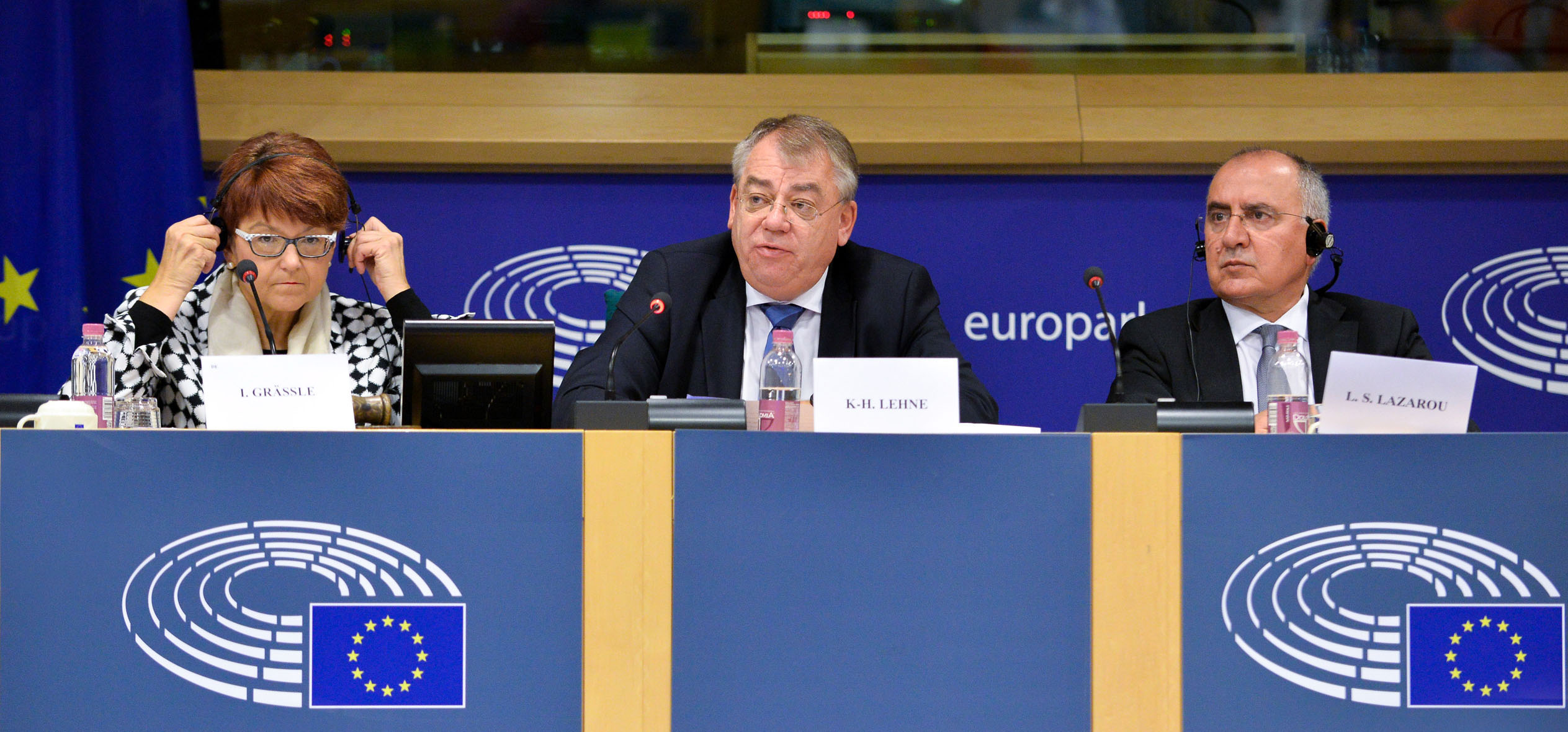
Main conclusions
- The 2016 accounts were prepared in accordance with international standards and present, in all material aspects, a true and fair view of the EU’s finances.
- Revenue in 2016 was free from material error.
- There has been a sustained improvement in the estimated level of error in the payments made from the EU budget over the last few years: 2016: 3.1 %, 2015: 3.8 % and 2014: 4.4 %. In 2016, a significant part of the audited expenditure — entitlement payments (in contrast with cost reimbursement payments) — was not affected by a material level of error.
- The Commission’s reporting on regularity is, for most areas, broadly in line with our results. However, the Commission should simplify performance measurement, for instance by reducing the number of objectives and indicators.
- Corrective action by Member States and by the Commission had a positive impact on the estimated level of error. Without this action, our overall estimated level of error would have been 1.2 % higher. However, sufficient information was available to further prevent, or to detect and correct, a significant proportion of errors.
- The total amount of payments the EU committed itself to making from future budgets was higher than ever before, and is projected to continue to rise. Clearing this backlog and preventing a new one from forming should be priorities when planning EU spending in the period after 2020.

‘The 2016 Annual Report is a historic report since it was quite a change from previous ones. For the first time we gave a qualified and no longer an adverse opinion regarding compliance on the expenditure side.’

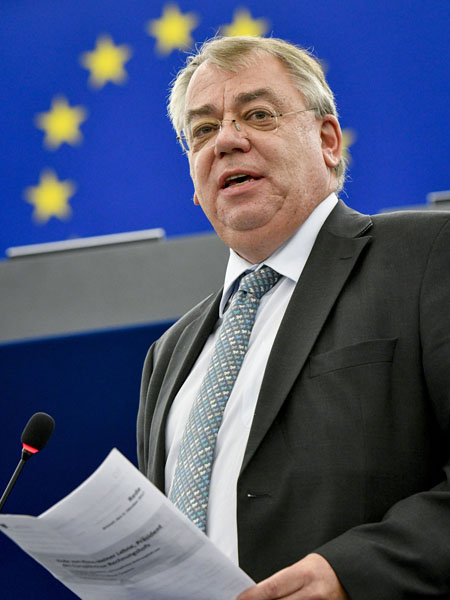
‘This year’s qualified opinion reflects an important improvement in EU finances. Going forward, we will take a fresh look at how we audit the EU budget:
- we will take greater account of internal controls at the European Commission and in the Member States, so we can better promote accountability and further improve the management of EU finances;
- we will also increase our focus on performance to ensure EU citizens get value for their money.’
The importance of the focus on the performance of EU spending and the results achieved was also echoed by the Parliament’s rapporteur for the 2016 discharge, Joachim Zeller MEP:
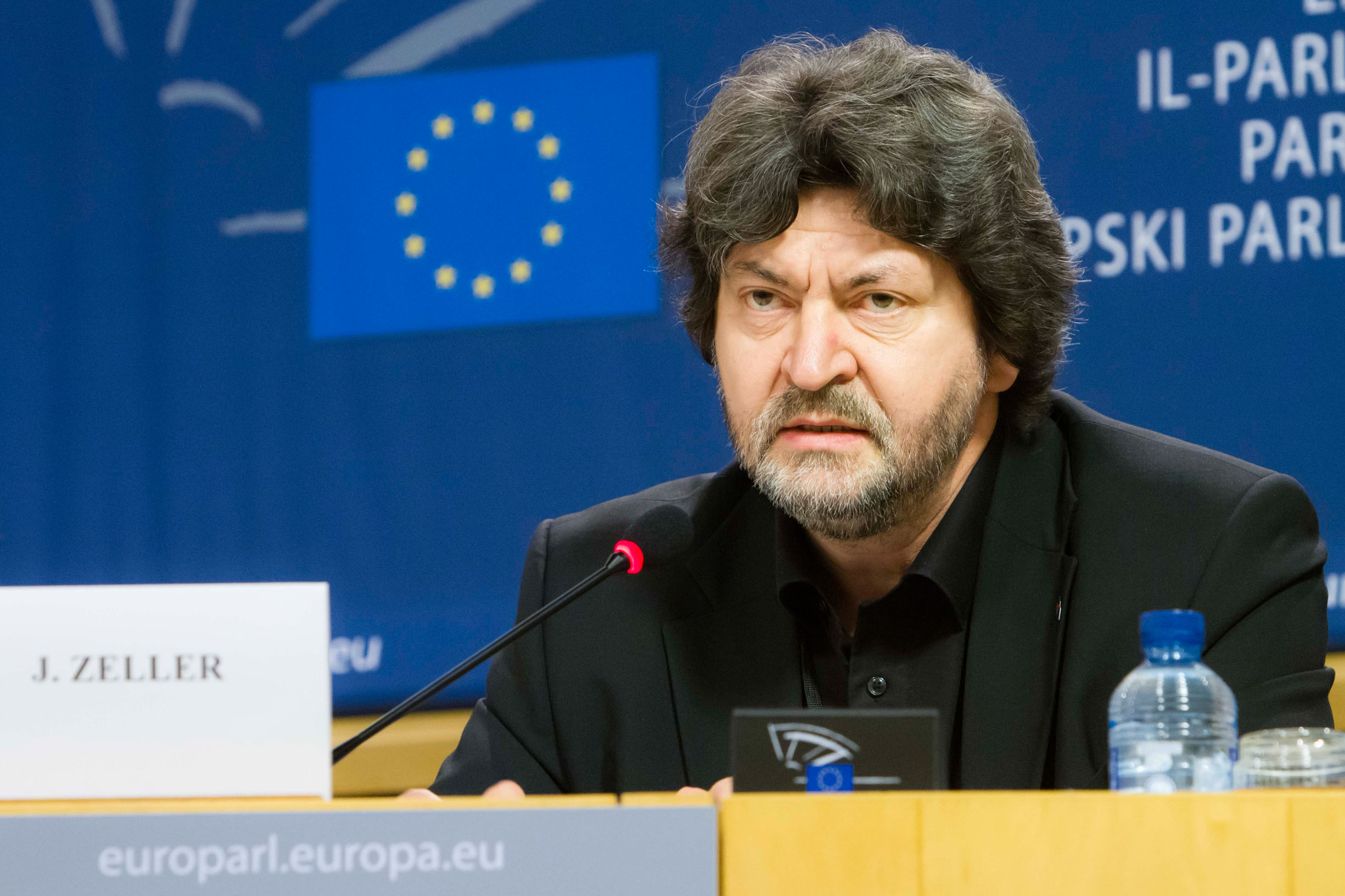
‘Error rates and whether, for example, structural funds money is used in accordance with the rules is all important but we should also look at what has been achieved with it.’
Annual report on European Development Funds
The European Development Funds (EDF) provide financial support to the African, Caribbean and Pacific (ACP) states and overseas countries and territories. They are funded by the Member States and managed outside the framework of the EU budget by the European Commission and, for some assistance, by the European Investment Bank (EIB).
Non-compliance with procurement rules accounted for around one third of the overall error in the EDFs. Other important types of error include expenditure that either has not actually been incurred or is ineligible.
Our annual report on the EDFs is published alongside our annual report on the EU budget and is available on our website (eca.europa.eu).
Specific annual reports
EU agencies, other bodies and joint undertakings are located throughout the European Union and perform specific tasks in areas of vital importance to EU citizens, such as health, safety, security, freedom and justice, and research.
In 2017, we audited whether their accounts were reliable and whether the transactions underlying these accounts complied with the rules. In forming our opinion on their accounts, we considered — where available — the audit work done by private audit firms. We also audited the Sisnet communication infrastructure, the European Schools, the Single Resolution Board’s contingent liabilities and the liquidation of the Galileo Joint Undertaking. We worked towards consolidating the results and expect to issue one single report for agencies in 2018.
Agencies (€3.4 billion budget, 10 364 staff)
Our audit found that the accounts of all 41 agencies gave a true and fair view. The financial transactions underlying the accounts of all agencies were legal and regular, except for the European Asylum Support Office, for which we issued a qualified opinion due to non-compliance with public procurement principles.
Joint undertakings (€1.8 billion budget, 633 staff)
The accounts of all eight joint undertakings were reliable. They presented their financial position, the results of their operations and their cash flows for 2016 fairly in all material respects.
Moreover, the transactions underlying the accounts of seven undertakings complied with the relevant rules, except for the ECSEL Joint Undertaking, for which we issued a qualified opinion as we could not obtain reasonable assurance as to the reliability of its internal controls for FP7 grant payments.
All our specific annual reports, together with the two summary reports, are available on our website (eca.europa.eu).
Special reports
During 2017, we published 28 special reports. In these reports, we checked in particular whether the objectives of selected EU policies and programmes were met, whether results were achieved effectively and efficiently and whether the EU funding had provided added value. We also provided recommendations for improvement, in terms of financial savings, better working methods, avoidance of waste or more cost-efficient achievement of the expected policy objectives.
Our special reports focused on topics reflecting the issues the EU has been facing such as the sustainable and environmentally friendly use of natural resources, generating growth and fostering inclusion, the challenges of migration and global development, the single market and the banking union, and ensuring an accountable and efficient European Union.
We will highlight two of these 28 special reports here: one on food waste, in which we examined whether EU policies were fit to fight this problem all along the entire food chain; the other on the Greek financial crisis, in which we examined the EU’s response to the financial and debt crisis in one of its Member States through the economic adjustment programmes.

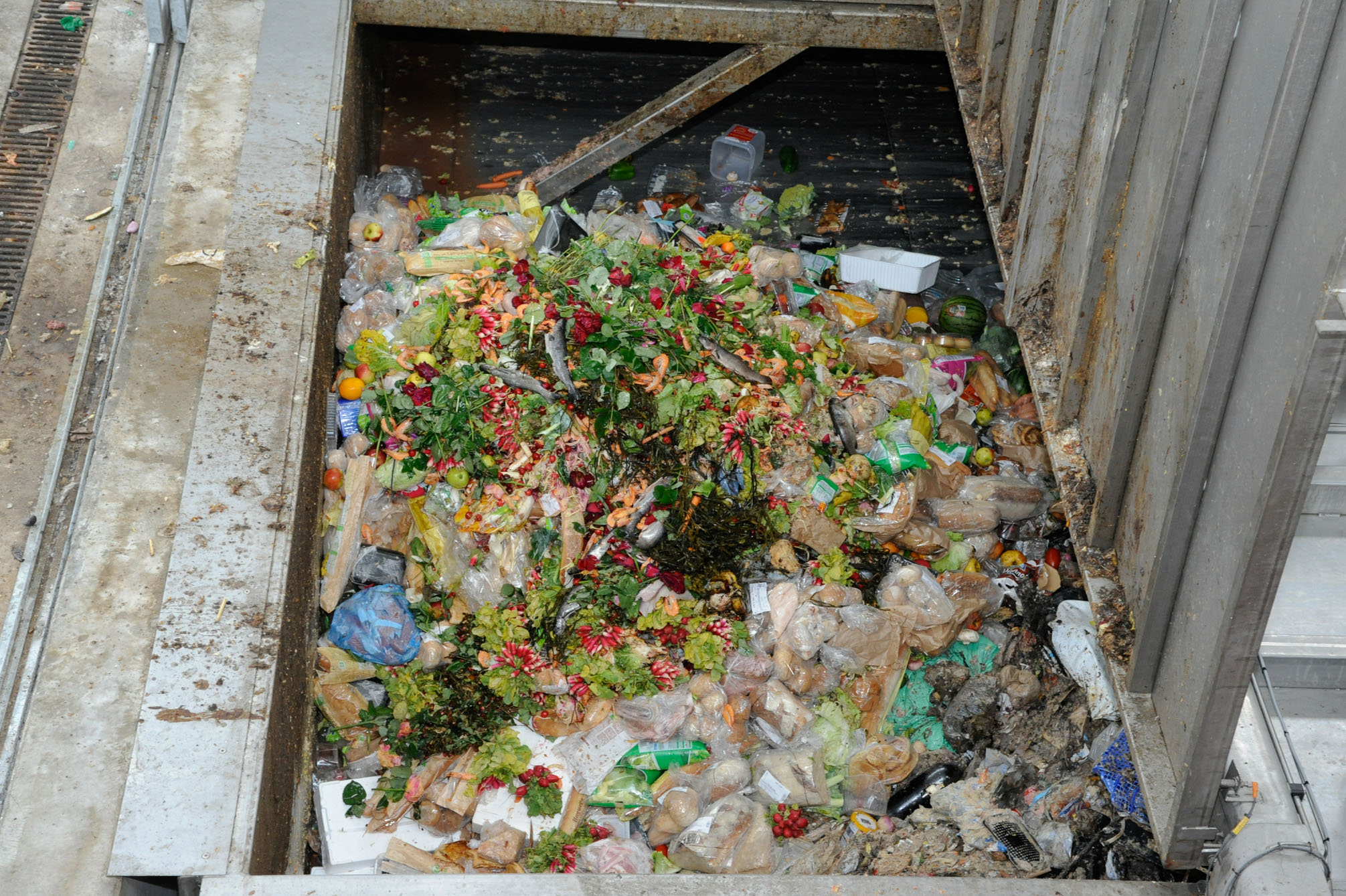
Food waste is a global problem
Food waste is a global problem that has moved up the public and political agenda in recent years, especially given the need to feed the rising global population. Current estimates indicate that, globally, around one third of the food produced for human consumption is wasted or lost, which represents huge economic and environmental costs.
EU Auditors examined what role the EU can play in combatting food waste
We looked in particular at the actions taken so far and how the various EU policy instruments work to reduce food waste. We focused on prevention and donation, which are the most preferred forms of action in the fight against food waste.
Our auditors interviewed staff from the Commission departments in charge of this policy, reviewed documents and carried out audit visits to five Member States: Italy (Lazio), the Netherlands, Portugal, Romania and Finland. They visited the relevant ministries and conducted on-the-spot visits. In addition, they consulted relevant stakeholders in the food production, retail, research and charity sectors.
‘The EU can, and should, do better to combat food waste effectively,’ say EU Auditors
Our auditors concluded that although a number of EU policies have the potential to combat food waste, this potential is not being exploited. Action to date remains fragmented and intermittent, while the coordination at European Commission level is lacking. Our report identified a number of missed opportunities and potential improvements which would not require new laws or more public money, and recommended better alignment of existing policies, along with a clear policy objective to reduce food waste.
We presented the report to the European Parliament’s Committee on Environment, Public Health and Food Safety and to the Committee on Budgetary Control, the Council of the EU, and a number of national parliaments across the EU. Both the European Parliament and the Council welcomed the report and endorsed its conclusions. The report also enjoyed significant media coverage, particularly on social media.
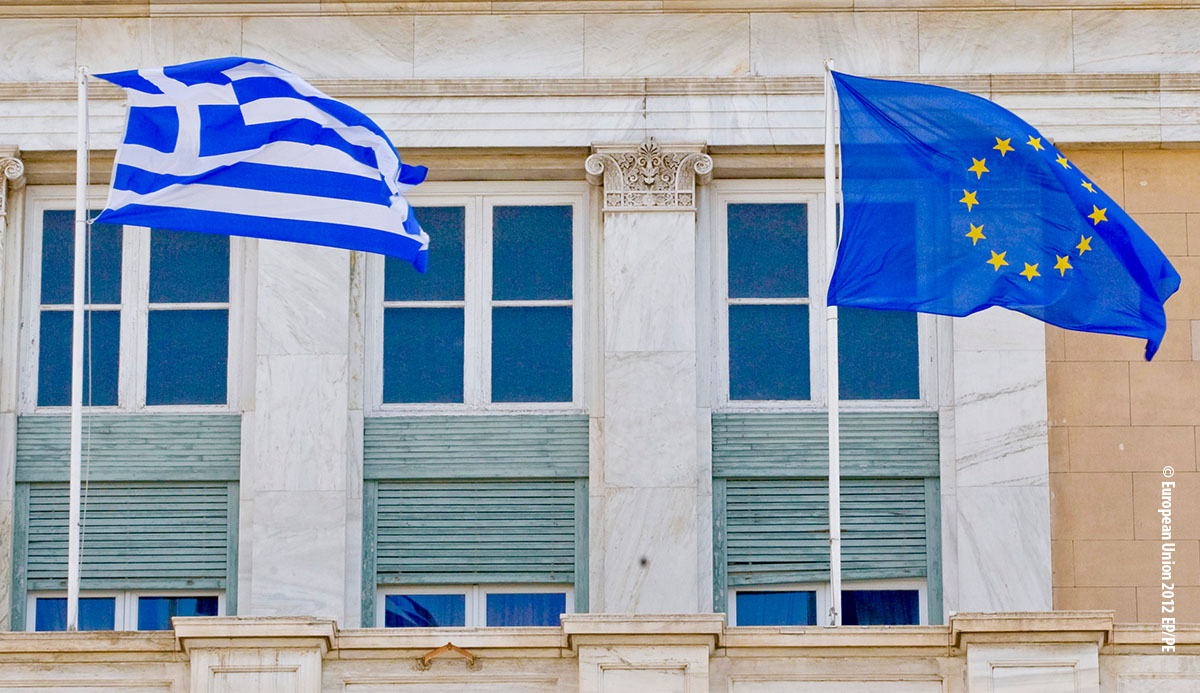
Greece needed assistance to ensure its financial stability
The 2008 financial crisis prompted an economic downturn and a debt crisis in Europe, which exposed the vulnerabilities of the Greek economy. By April 2010, Greece could no longer viably finance itself on the financial markets, so it requested financial assistance from the euro area Member States and the International Monetary Fund (IMF).
Since then, Greece has participated in three economic adjustment programmes, managed by the European Commission, the European Central Bank and the IMF — the so-called ‘Troika’. The third one also involved the European Stability Mechanism (ESM). Assistance of a total value of €368.6 billion was subject to policy conditions, set by agreement between the Greek authorities and the lenders.
These programmes were aimed at establishing a stable economic situation in Greece by covering the economy’s financing needs, thereby preventing contagion across the rest of the euro area. In return, Greece pledged to implement wide-ranging structural reforms.
EU Auditors examined whether the Commission had managed the economic adjustment programmes appropriately
This audit was part of a series of our performance audits in recent years on the actions and reforms undertaken in response to the 2008 financial crisis. Our auditors assessed how the Commission had handled the first two programmes for Greece and designed the third. They reviewed the documents relating to the EU’s financial assistance programmes, analysed programme conditions and interviewed staff from the Commission, the national authorities (such as sector ministries), the Bank of Greece, business unions and stakeholders, and staff from the IMF, the ESM and the OECD.
‘Economic Adjustment Programmes for Greece: some reform, despite weaknesses,’ say EU Auditors
Our auditors concluded that the economic adjustment programmes for Greece had provided short-term financial stability and made some progress on reform possible. However, the programmes helped Greece recover only to a limited extent. They also noted that the Commission had no prior experience in managing such a process, that the programmes’ conditions were neither sufficiently prioritised by importance nor embedded in a broader strategy for Greece and that the programmes’ macro-economic assumptions were poorly justified.
We presented this special report to the European Parliament’s Committee on Budgetary Control and to institutional stakeholders in Greece. The report received extensive media coverage and achieved the most significant media coverage of all our special reports in 2017.
Significant events
The ECA’s 40th anniversary
12 October 2017, Hémicycle, Luxembourg

The 40th anniversary of the establishment of our institution was marked with an official ceremony in the presence of their Royal Highnesses the Grand Duke and Grand Duchess of Luxembourg, as well the country’s Prime Minister Xavier Bettel.
The ceremony was opened by our President, Klaus-Heiner Lehne, followed by speeches from Antonio Tajani, President of the European Parliament, Kersti Kaljulaid, President of Estonia, and Jean-Claude Juncker, President of the European Commission.
Alongside the ceremony, we held an annual conference bringing together the heads of the supreme audit institutions (SAIs) of EU Member States (the ‘EU Contact Committee’), along with SAI heads from candidate and potential candidate countries.
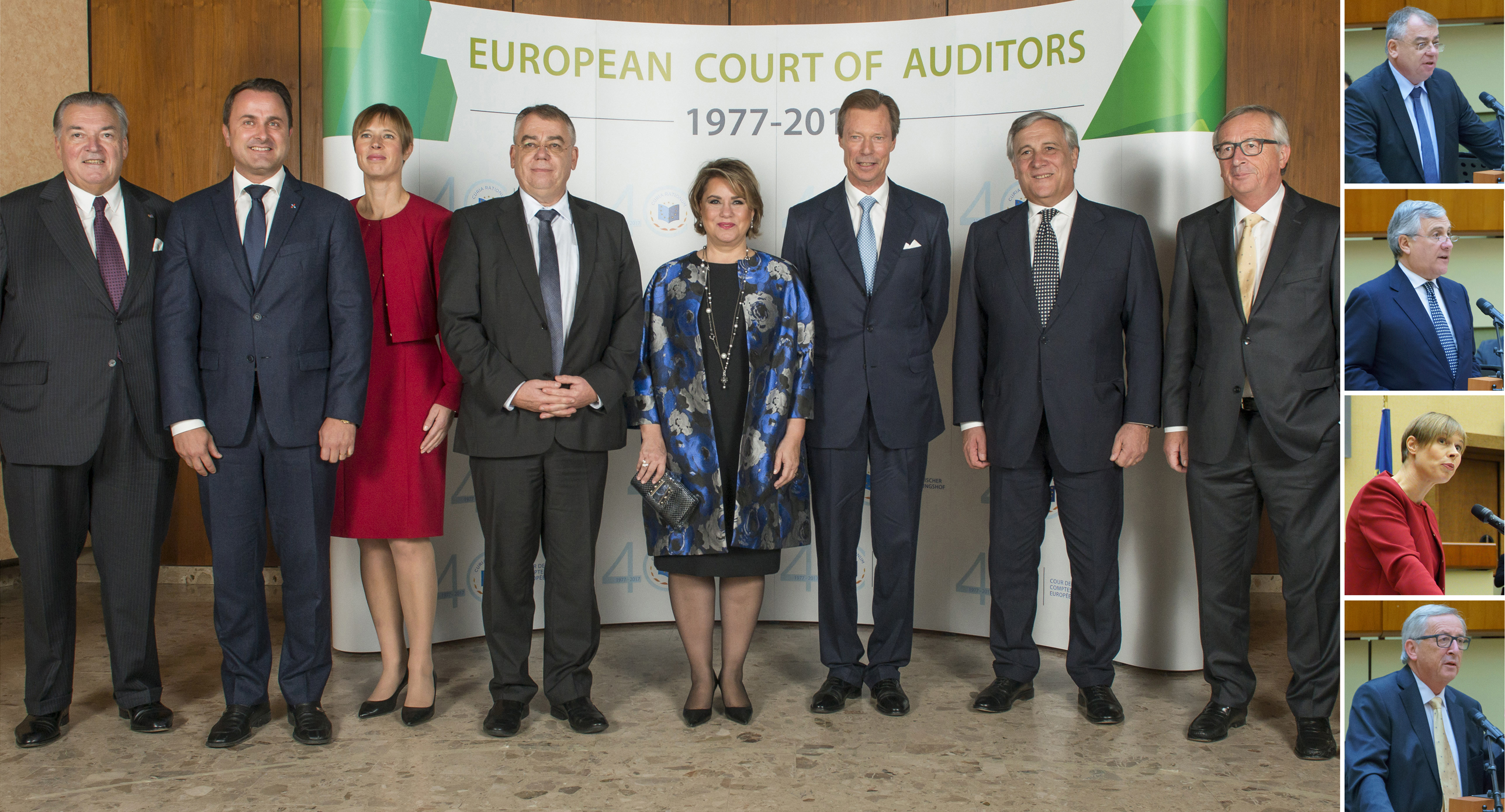
ECA conference on youth employment — confronting challenges and finding solutions
10 May 2017, European Parliament, Brussels
This conference was organised following the publication of our special report on the Youth Guarantee, which — together with other reports — looked at the effectiveness of EU policies to help tackle the problem of youth unemployment across the EU Member States. During the conference, reporting Member Iliana Ivanova and the auditors debated with high-level representatives from EU institutions, employment organisations and young people whether EU policies were delivering results and discussed the best way forward.

ECA conference on EU action on energy and climate change
17 October 2017, European Parliament, Brussels
This conference was an integral part of our work on the landscape review of EU action on energy and climate change, which we published in September 2017 and later also presented at the United Nations Climate Change Conference (COP23) in Bonn. The conference provided a platform for stakeholders and key contributors to the topic from both the public and private sectors to discuss the challenges ahead.
We organised the conference together with the European Parliamentary Research Service. It was opened by reporting Member Phil Wynn Owen, and Jerzy Buzek, Chair of the European Parliament’s Committee on Industry, Research and Energy. In attendance were representatives of Member States, EU institutions, supreme audits institutions, NGOs and think tanks, as well as Members of the European Parliament (MEPs), academics and our auditors.
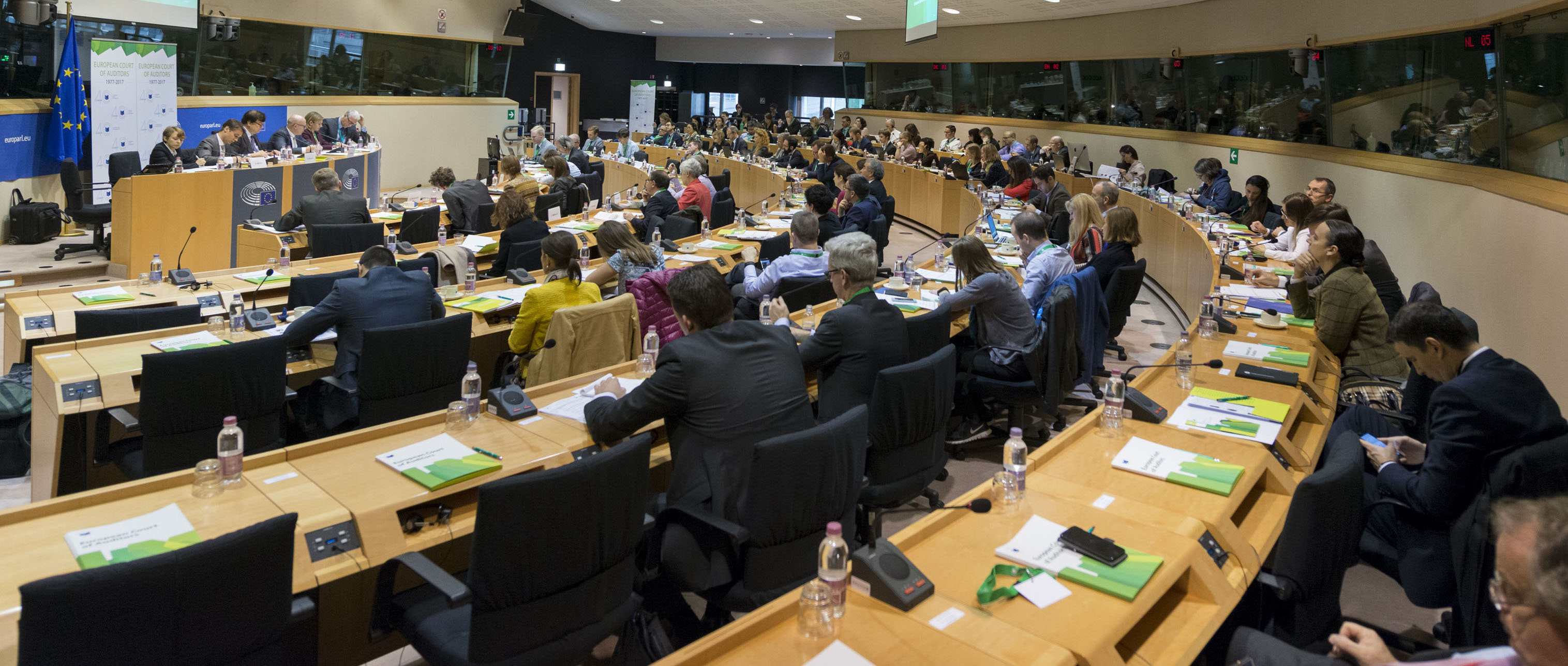
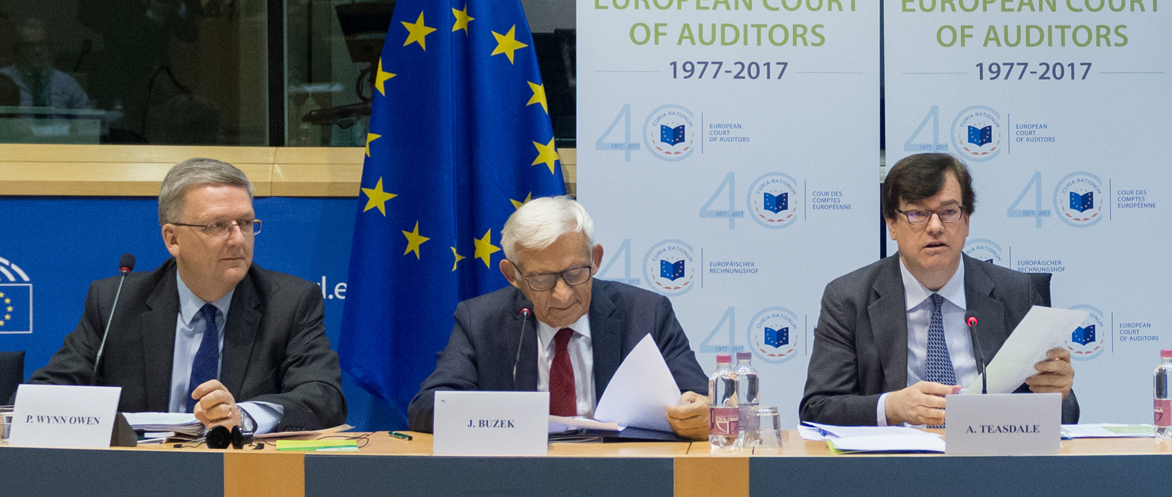
ECA symposium on Regulatory Impact Analysis (RIA)
23 and 24 November 2017, ECA Luxembourg
This two-day symposium to discuss RIA gathered around 100 participants consisting of academics, think thanks, research centres and international organisations, as well as European, national and local institutions. They submitted their papers following an open call for contributions, and presented and discussed them during the symposium. The symposium was chaired by ECA Member Danièle Lamarque and was organised in collaboration with the academic journal ‘Politiques et management public’.
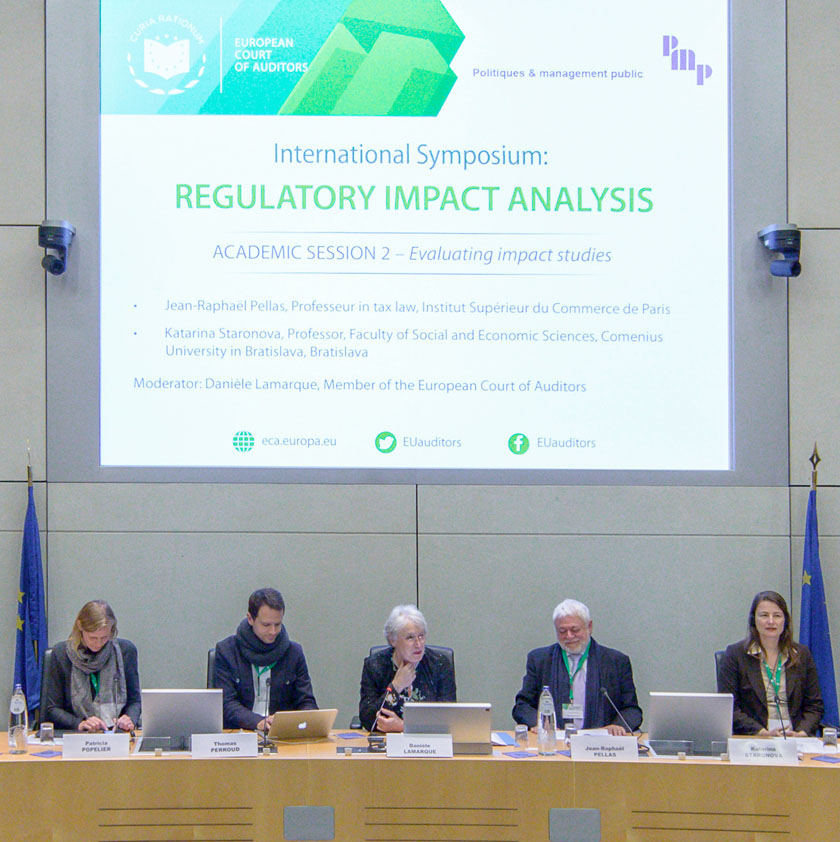
Relations with institutional stakeholders
We work closely with the European Parliament, the Council of the EU and national parliaments. This is essential, as the impact of our work largely depends on how they use our audit results and recommendations. That is why it is also important that we take their concerns and suggestions into account when planning our annual work programme.
European Parliament
In February 2017, President Klaus-Heiner Lehne presented our 2017 work programme to the Parliament body that coordinates the work of its committees — the Conference of Committee Chairs (CCC). He invited all parliamentary standing committees to suggest potential audit tasks for our 2018 work programme. Three quarters of the parliamentary committees provided their suggestions and we have now taken up around two thirds of these in our work.
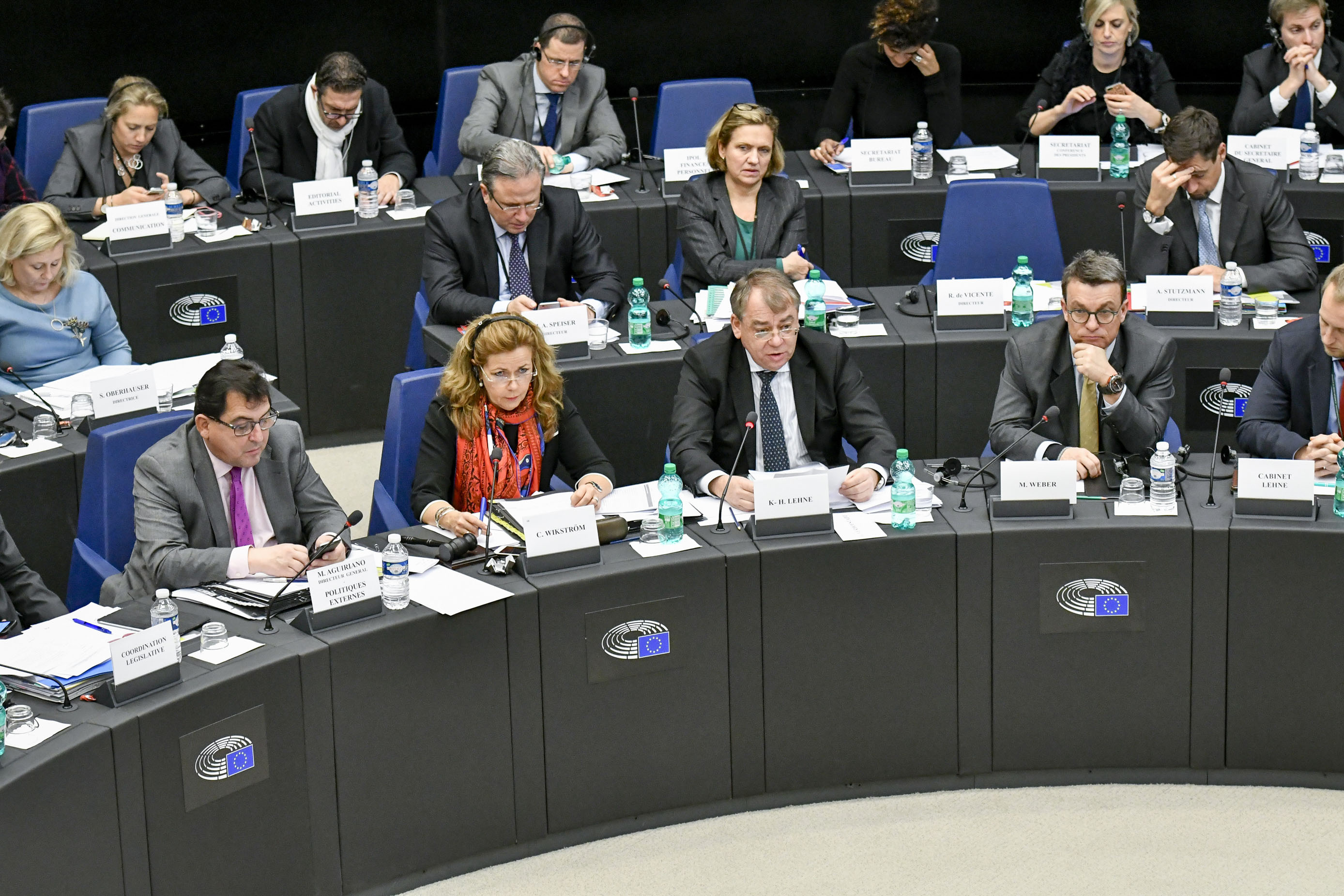
In April 2017, President Lehne took part in the Parliament’s plenary debate on the 2015 discharge. In September and October 2017 he presented our 2016 annual report to the Parliament’s Committee on Budgetary Control (CONT) and to the plenary session, respectively. The Conference of Presidents of the Parliament’s political group leaders invited President Lehne to its meeting in November 2017 to discuss our strategy and work programme.
It is established practice for our Members to present our reports and other work to the CONT. During the year, we made almost 60 presentations to this committee. Our Members also exchange views with other standing committees and delegations. In 2017, we presented our reports at 23 such meetings, mainly in the committees on agriculture and rural development, industry, research and energy, as well as in the regional development, and employment and social affairs committees.
In addition, our Members attended the coordinators’ meetings of the Committee on Agriculture and Rural Development and the Committee on Environment, Public Health and Food Safety, following their specific interest in our work. Furthermore, the Parliament invited us to present our special report on migration hotspots at its conference on migration management.
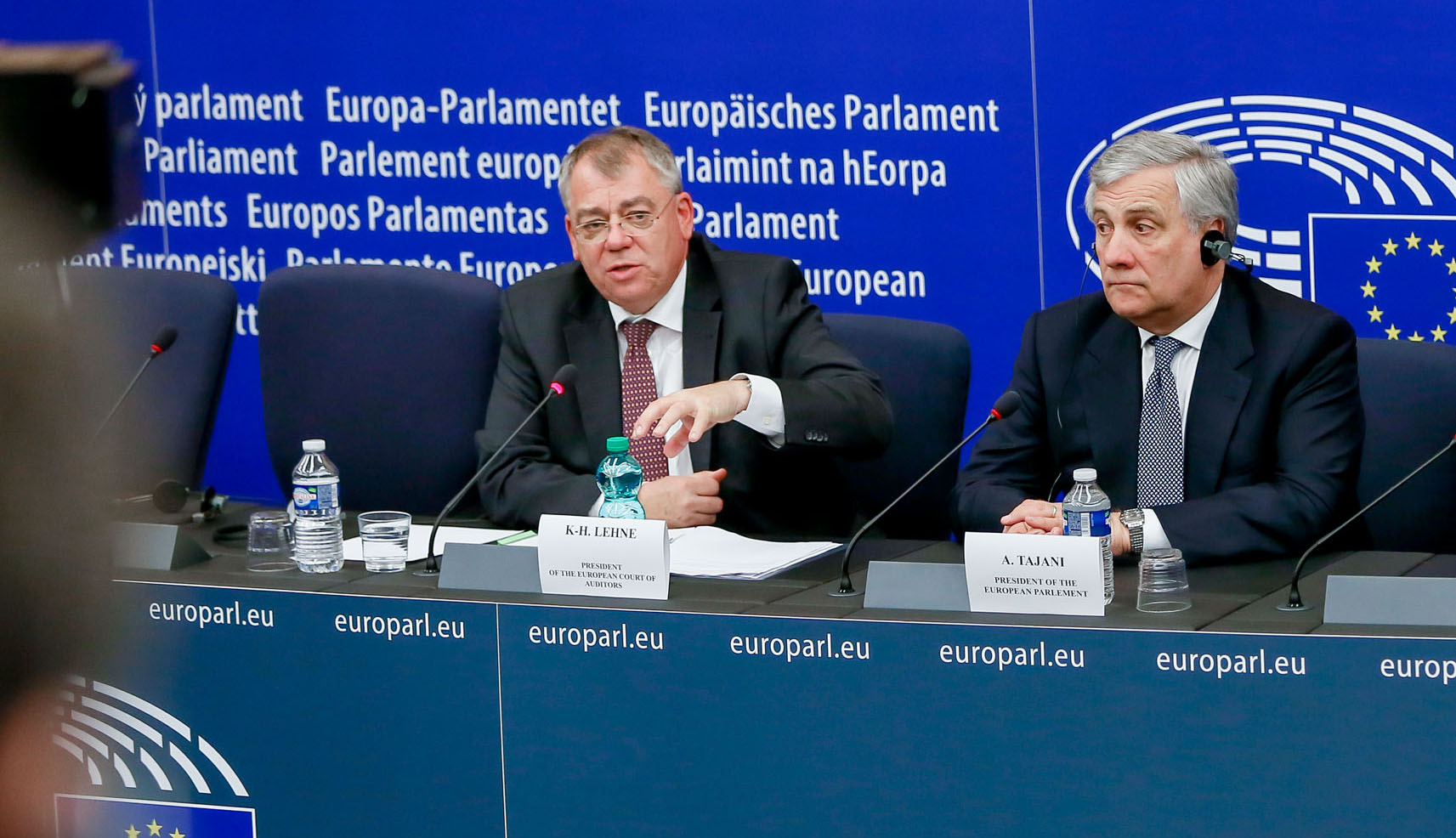
Council
In June 2017, during Malta’s Council Presidency, President Lehne and Member Leo Brincat (Malta) met with the Maltese Minister for European Affairs Helena Dalli and the Parliamentary Secretary for European Funds and Social Dialogue Aaron Farrugia, in Valletta (Malta). In September 2017, during Estonia’s Council Presidency, our President, Member Juhan Parts (Estonia) and the Member for Institutional Relations, Rimantas Šadžius, met with Estonia’s Prime Minister Jüri Ratas and Finance Minister Toomas Tõniste, in Tallinn.
During the year, representatives of both Council Presidencies also paid a visit to our institution in Luxembourg.
In November 2017, President Lehne presented our annual report to the EU Ministers of Finance at Ecofin (the Economic and Financial Affairs Council) in Brussels.
At working level, our main interlocutor is the Council’s Budget Committee, which deals with all financial issues, including the discharge procedure. In 2017, our auditors attended several meetings of the other Council preparatory bodies to present our reports, mainly Council Working Parties on Structural Measures, Environment and Financial Agricultural Questions.
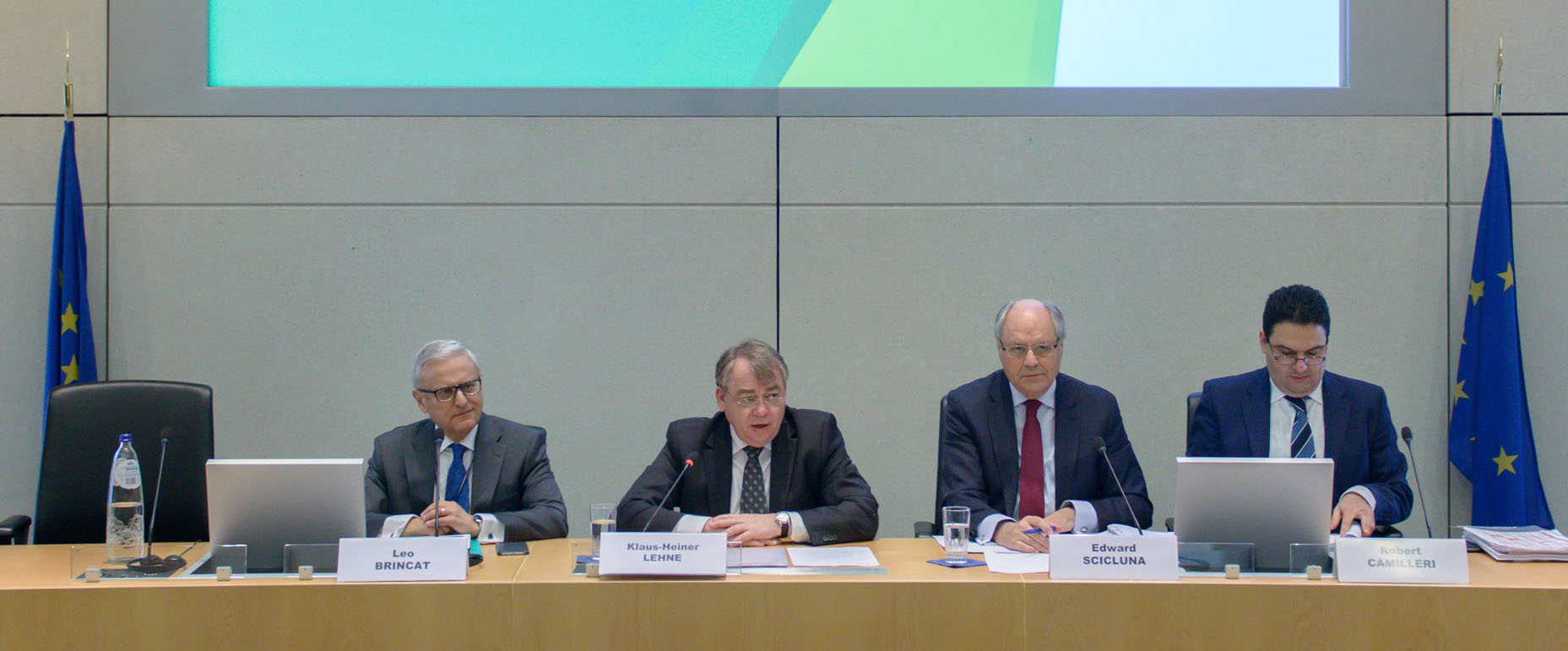
Member State governments and parliaments
During the year, President Klaus-Heiner Lehne met with a number of high-level government representatives in EU Member States. These included Poland’s President Andrzej Duda in Warsaw, Portugal’s President Marcelo Rebelo de Sousa and Prime Minister António Costa in Lisbon, Spain’s Prime Minister Mariano Rajoy in Madrid and France’s Minister for European Affairs, Nathalie Loiseau, and Minister for Public Action and Accounts, Gérald Darmanin, in Paris, and he also met Sabine Thillaye, President of the National Assembly’s European Affairs Committee. On these visits, he was accompanied by ECA Members Janusz Wojciechowski (Poland), João Figueiredo (Portugal), Baudilio Tomé Muguruza (Spain) and Danièle Lamarque (France), respectively.
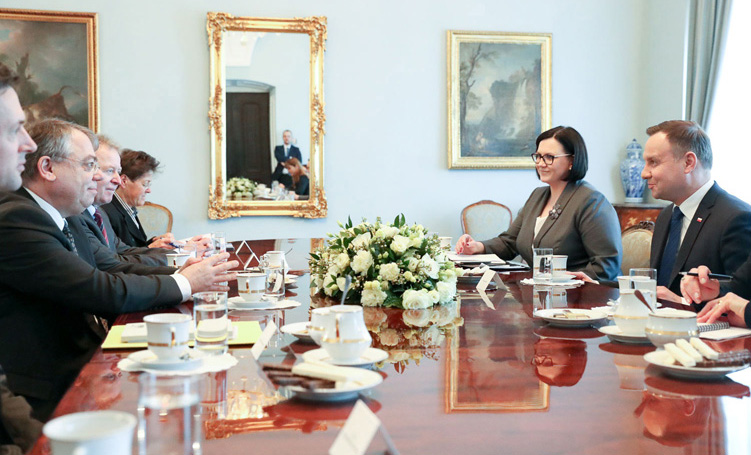
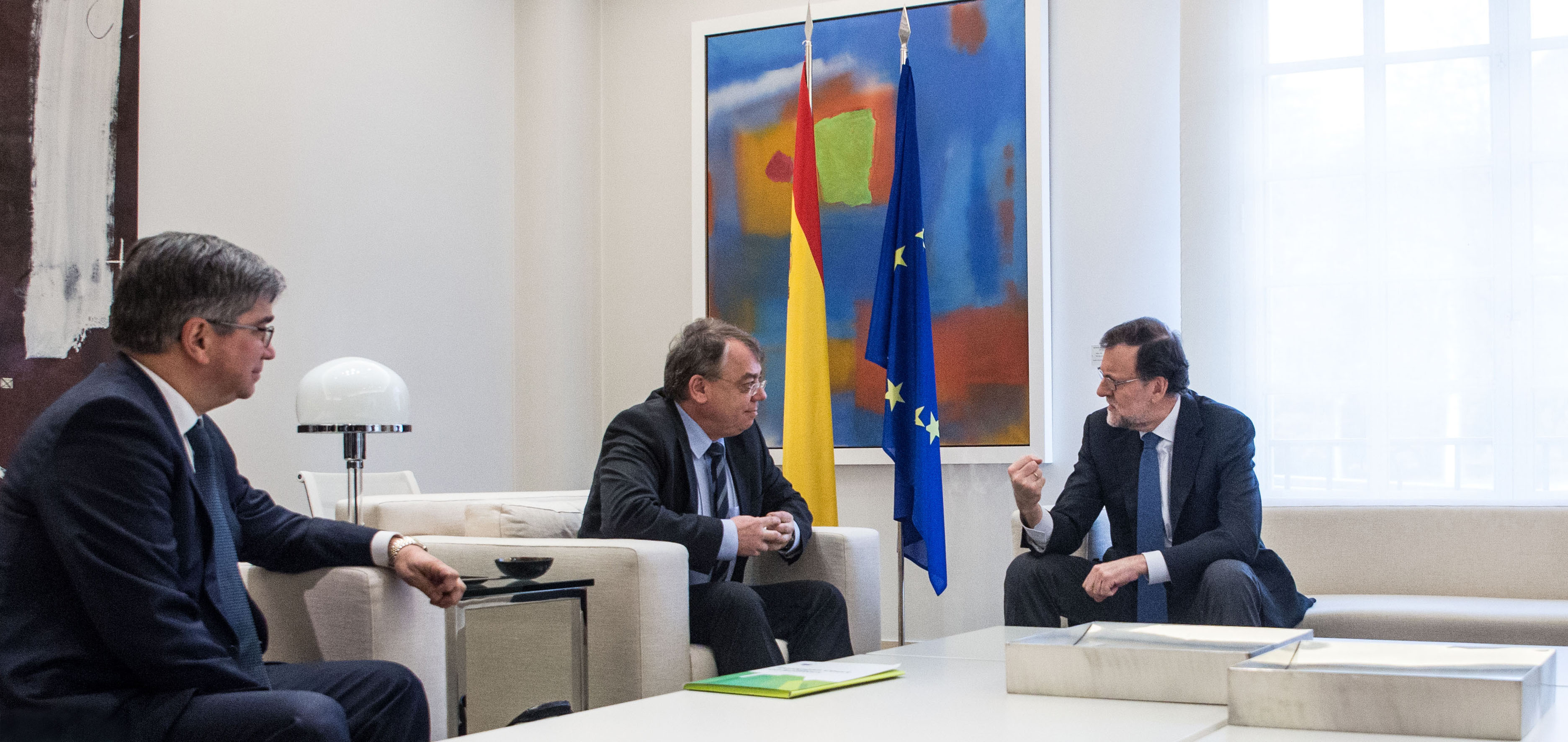
In 2017, our Members presented our 2016 annual report to the national parliaments in 14 Member States: Czech Republic, Greece, Spain, Cyprus, Latvia, Lithuania, Luxembourg, Malta, Netherlands, Poland, Portugal, Slovenia, Finland, Sweden. They also presented a number of special reports to the relevant national parliamentary committees.
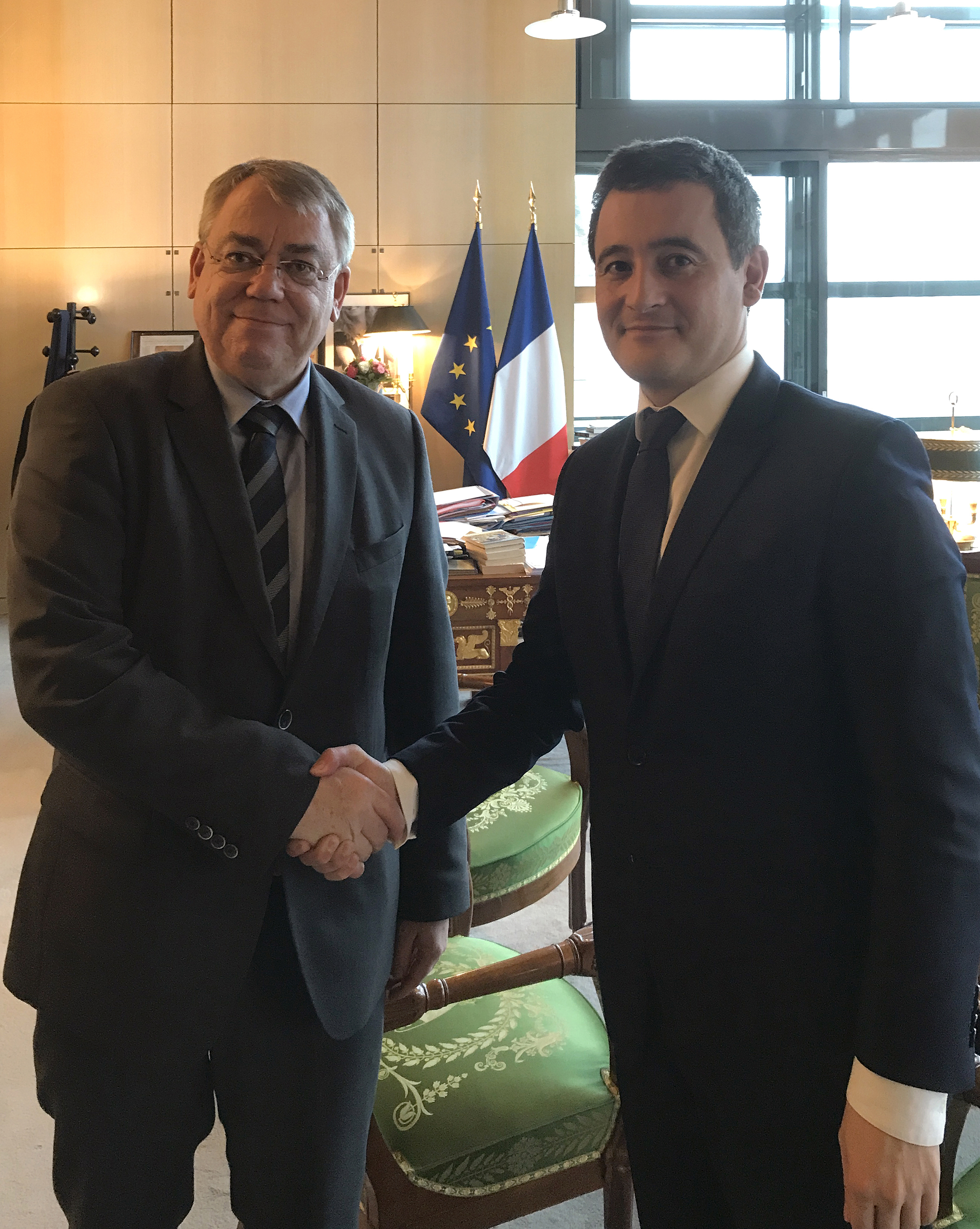
Cooperation with supreme audit institutions
EU Contact Committee of the Member States Supreme Audit Institutions
During 2017, we hosted and chaired the annual EU Contact Committee meeting of the heads of supreme audit institutions (SAIs) of the 28 EU Member States. Discussions focused on the role of SAIs in restoring the trust of EU citizens in national and supranational government institutions.
In addition, we contributed to or participated in the activities of the working bodies on the EU banking union, structural funds, the Europe 2020 strategy, fiscal policy audit, value added tax, public sector accounting standards for EU Member States (EPSAS) and the prevention and combating of irregularities and fraud.
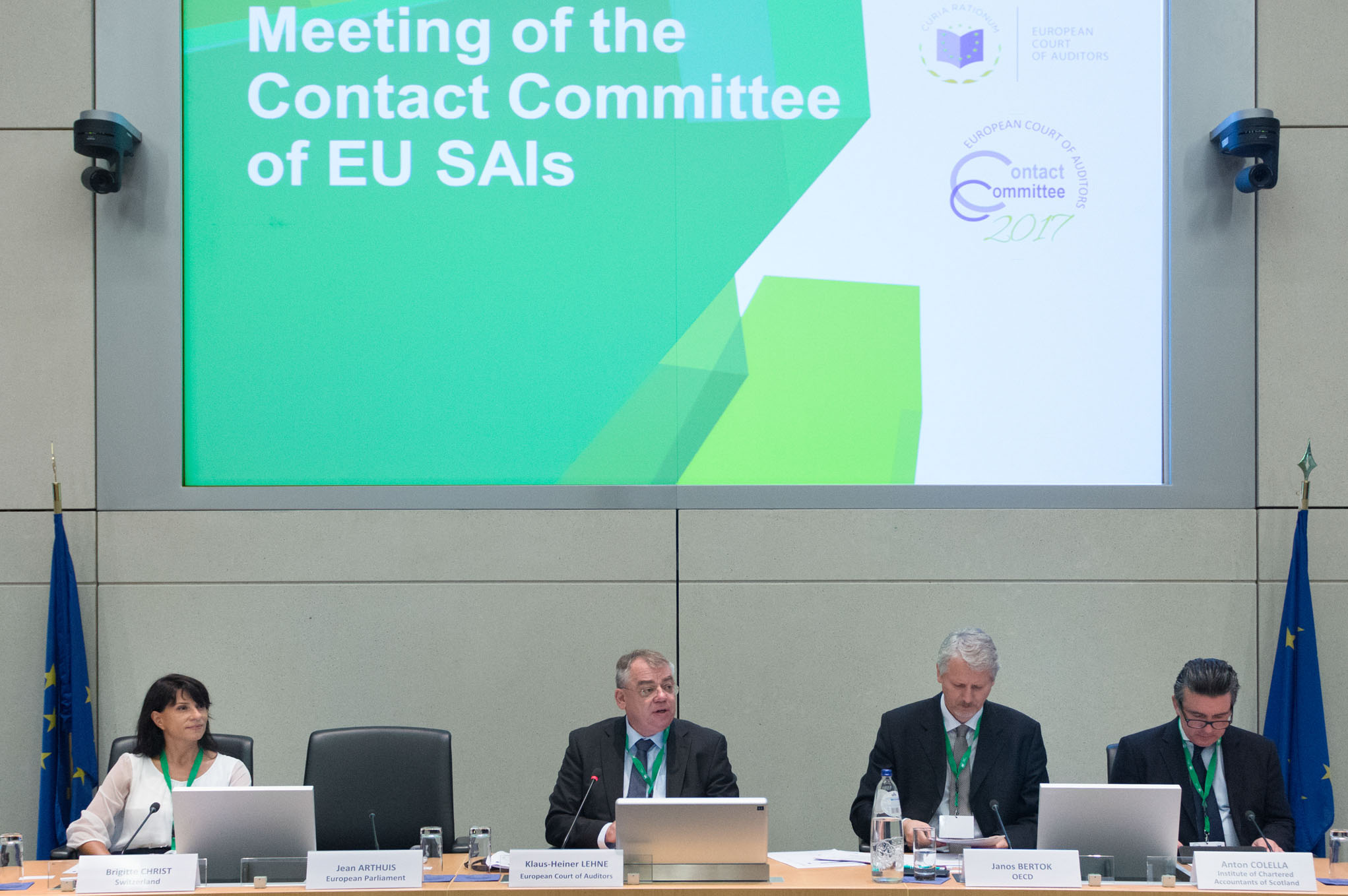
Network of SAIs of EU candidate and potential candidate countries
We also support the SAIs of EU candidate countries and potential candidates (Albania, Bosnia and Herzegovina, the former Yugoslav Republic of Macedonia, Kosovo*, Montenegro, Serbia and Turkey), mainly through a network similar to the Contact Committee. Throughout 2017, nine auditors from the network’s SAIs took part in our internship programme. We also contributed actively to several meetings and activities of this network, dealing with topics such as combating fraud and corruption and organising workshops on financial and compliance audit.
Moreover, we participated in a parallel performance audit on public procurement, which was led by the Swedish SAI.
In October 2017, we hosted and participated in a meeting of the heads of the network’s SAIs to adopt a work plan for 2018 and beyond.
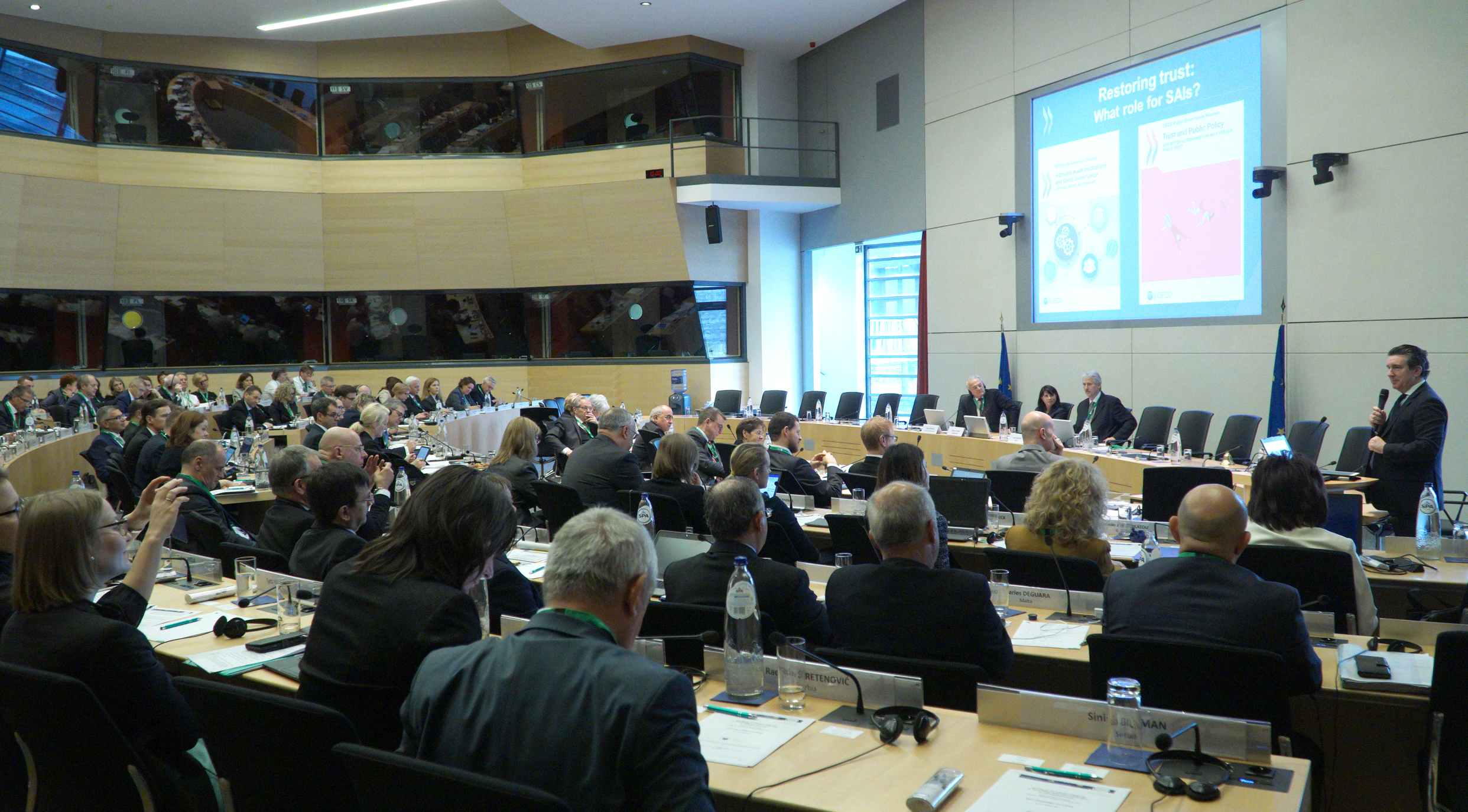
INTOSAI/EUROSAI
During 2017, we continued our active involvement in and contribution to the activities of INTOSAI, most notably as Vice-Chair of the Professional Standards Committee (PSC) and as a member of its subcommittees on financial audit and accounting, compliance audit and performance audit. We also actively participated in the activities of other INTOSAI working bodies and EUROSAI working bodies. Our mandate as a member of the EUROSAI Governing Board finished with the X EUROSAI Congress in May 2017.
- INTOSAI — International Organisation of Supreme Audit Institutions
- EUROSAI — European Organisation of Supreme Audit Institutions
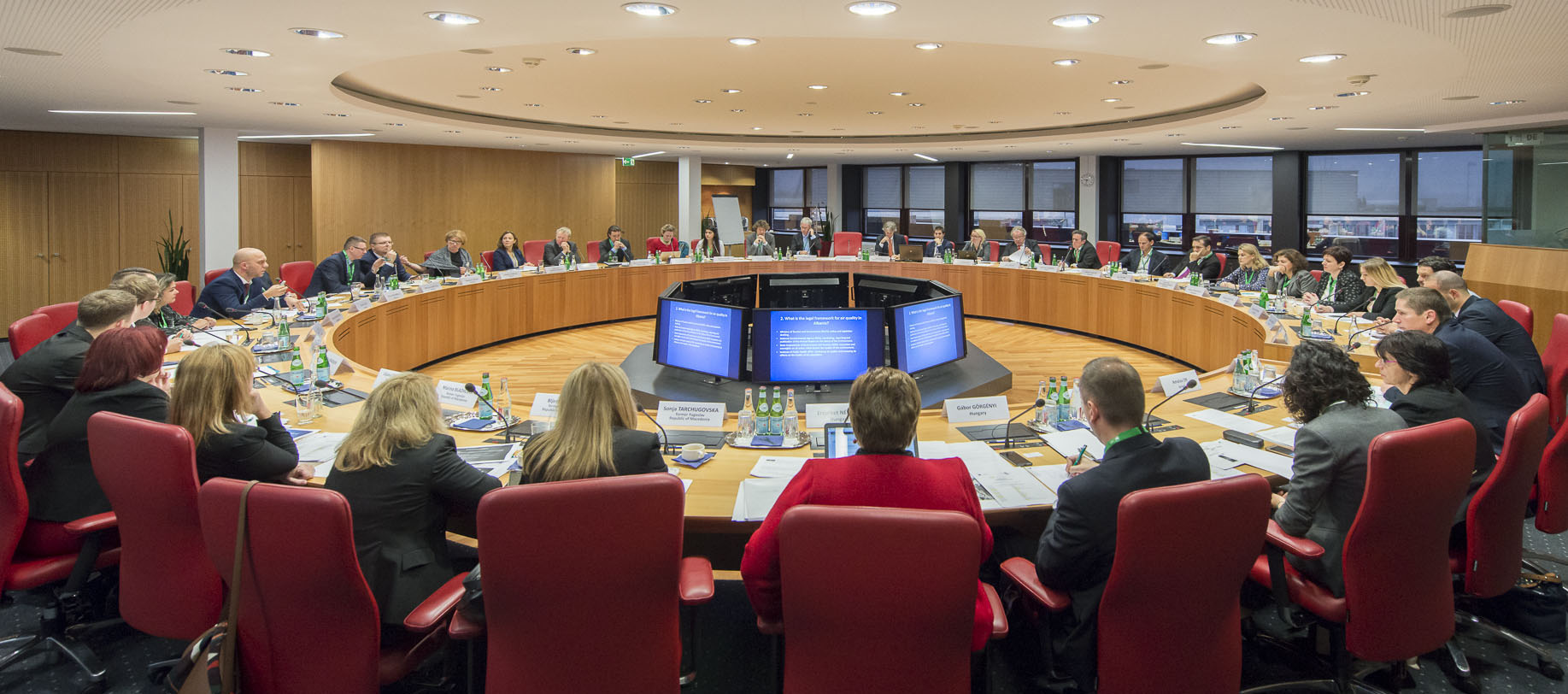
Our management
The College of Members
Our Members serve a term of 6 years, which can be renewed. They perform their duties in complete independence and in the general interest of the EU. Upon taking office, they swear an oath to that effect before the European Court of Justice.
The College comprises 28 Members, one from every Member State. The Council of the EU appoints each Member after consultation with the European Parliament, following nomination by their respective national government.
In 2017, the Council appointed our two new Members:
- Juhan Parts (Estonia), as from 1 January 2017;
- Ildikó Gáll-Pelcz (Hungary), as from 1 September 2017.
President
The Members elect a President from among themselves for a renewable period of 3 years. He or she then assumes the role of primus inter pares (first among equals). In addition to his other responsibilities, the President supervises the performance of our work and represents our institution externally. Klaus-Heiner Lehne (Germany) was elected President in September 2016.
Audit chambers and committees
Members are assigned to one of our five audit chambers, where reports, opinions and other review-based publications are adopted. Each chamber has an EU policy-based theme to guide its work. They are headed by a Dean, who is elected from and by the Members of that chamber. Each Member is responsible for his or her own audit tasks. Members are assisted by a private office.
As at December 2017, the Deans of our five audit chambers were Phil Wynn Owen (United Kingdom), Iliana Ivanova (Bulgaria), Karel Pinxten (Belgium), Baudilio Tomé Muguruza (Spain) and Lazaros S. Lazarou (Cyprus). Danièle Lamarque (France) chaired our Audit Quality Control Committee. Rimantas Šadžius (Lithuania) was responsible for coordinating our interinstitutional relations.
Decisions on broader strategic and administrative issues are taken by the administrative committee and, where appropriate, by the College of Members. Both are chaired by the President.
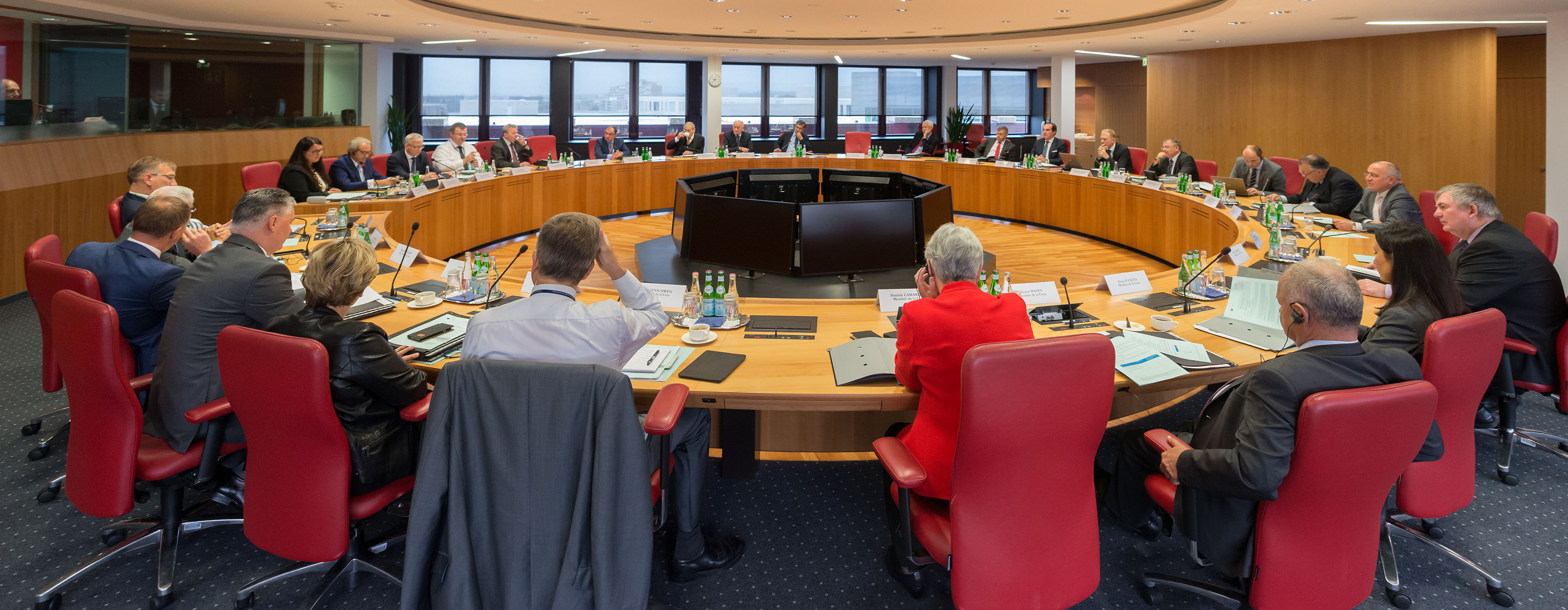
European Court of Auditors: organisation chart as at 31 December 2017
President
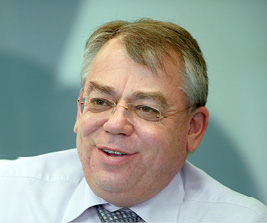
Germany
Chamber I
Sustainable use of natural resources

United Kingdom
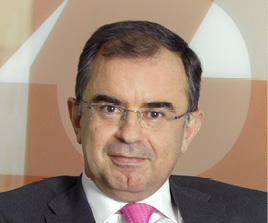
Greece
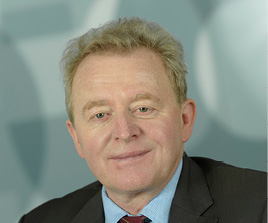
Poland
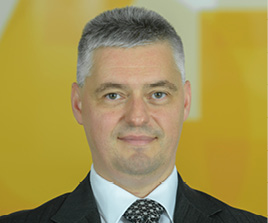
Slovenia

Portugal
Chamber II
Investment for cohesion, growth and inclusion
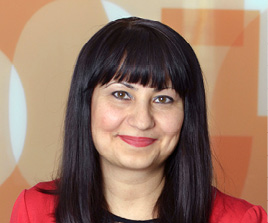
Bulgaria
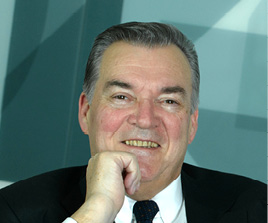
Luxembourg
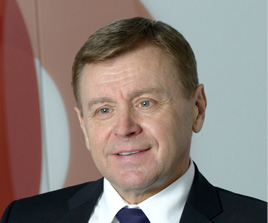
Slovakia

Romania
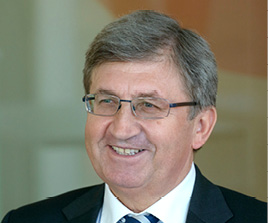
Austria
Chamber III
External action, security and justice
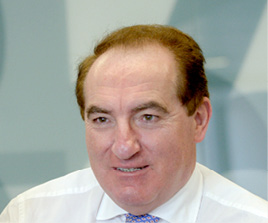
Belgium
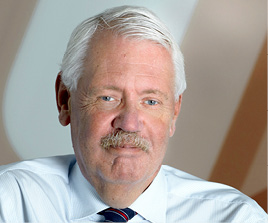
Sweden

Finland
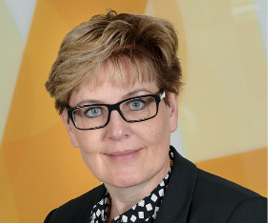
Denmark
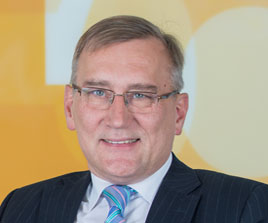
Estonia
Chamber IV
Regulation of markets and competitive economy
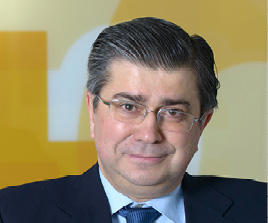
Spain

Ireland
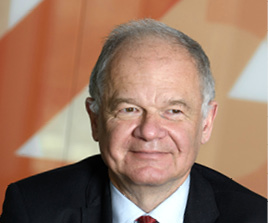
Croatia

Netherlands
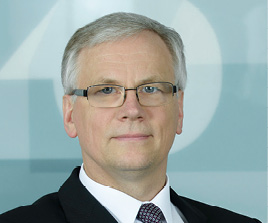
Lithuania
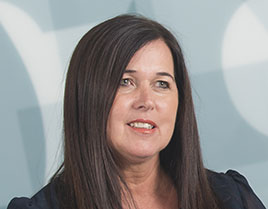
Hungary
Chamber V
Financing and administering the Union
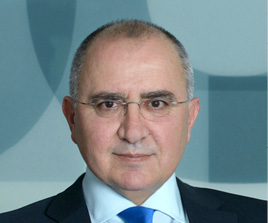
Cyprus
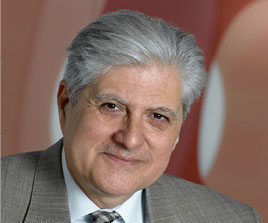
Italy

Czech Republic
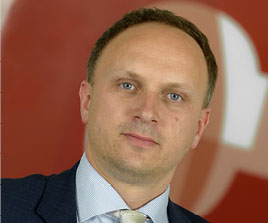
Latvia

Malta
Member for Audit Quality Control Committee
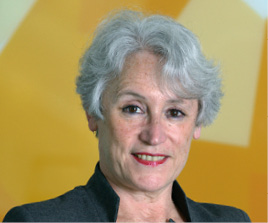
France
Strategy
The upcoming 3 years will be a crucial period for the European Union, with pivotal decisions to be taken. We recognise that successfully addressing the challenges facing the European Union requires clear, reliable and accessible information for EU citizens. They need to be able to see that the EU acts with integrity, applies the rule of law, spends taxpayers’ money carefully, is clear about its objectives and achieves the results it has promised. This is where we, as the EU’s external auditor, can make our contribution.
In July 2017, we published our strategy for the 2018-2020 period, in which we identified four strategic goals:
- get clear messages across to our audiences;
- increase focus on performance aspects of EU action;
- improve the added value of the statement of assurance; and
- gear our organisation towards our products.
Through our independent audits, we can provide insight into what works and what does not work in EU spending and EU action, help EU citizens decide whether the EU institutions are delivering results for them and thereby contribute to fostering trust in the EU. To do so, our audits also need to relate to the concerns of our ultimate stakeholder, the European citizen.
The strategy for the 2018-2020 period defines five priority areas for the ECA’s work in the coming years.

In the process of developing our strategy, we relied heavily on consultation, both internal and external. We discussed the strategy with our staff and reached out to Members of the European Parliament, EU Member State representatives, the European Commission, other supreme audit institutions and non-institutional stakeholders such as academics, think tanks, non-governmental organisations (NGOs) and private sector auditors.
The ECA strategy for 2018-2020 is available on our website (eca.europa.eu).
Work programming
In January 2017 we decided on new programming procedures, which we applied for the first time for the 2018 annual work programme, issued in October last year.
The main changes in the programming of our work are:
- the development of a Court-wide portfolio of audit tasks;
- a centralised selection process from audit ideas to potential audit tasks and final audit proposals;
- more flexible resource allocation to and across audit chambers in accordance with the workload;
- the broadening of the product portfolio through audit tasks, resulting in review-based publications; and
- the definition of high-priority audit tasks with tighter deadlines.
We have also agreed a procedure with the European Parliament’s CCC through which all parliamentary standing committees can suggest potential audit topics for the ECA to consider.
Our 2018 work programme is available on our website (eca.europa.eu).
Measuring performance
During the 2013-2017 period, we applied seven key performance indicators (KPIs) to inform our management about progress made towards achieving our goals, support decision-making and provide our stakeholders with information on our performance.
The aim of these indicators was to measure key elements of the quality and impact of our work, paying particular attention to the opinion of key stakeholders and the efficiency and effectiveness of the way we use our resources.
An updated set of performance indicators will come into effect in 2018 for the period 2018-2020 period.
Quality and impact of our work
We assessed the quality and impact of our reports based on stakeholder appraisal, expert reviews and the follow-up given to the recommendations for improving EU financial management. In addition, we measure our presence in the media.
Stakeholder appraisal
We invited our main institutional stakeholders and peers — the European Parliament’s Committee on Budgetary Control and Committee on Budgets, the Council’s Budget Committee, the main auditees in the Commission and European agencies, and the heads of EU SAIs — to rate the reports we publish.
In 2017, similar to previous years, a large majority of the respondents rated the usefulness and impact of our reports to be ‘high’ or ‘very high’.

Expert reviews
Each year, independent external experts reviewed the content and presentation of a sample of our reports to assess their quality. In 2017, the reviewers assessed six special reports* and the 2016 annual reports. They rated the quality of various aspects of the reports on a four-point scale ranging from ‘significantly impaired’ (1) to ‘high quality’ (4). The results have been very steady in recent years, indicating the quality of our reports as being satisfactory.

Follow-up of recommendations
During the year, we systematically monitored the extent to which auditees had implemented our recommendations.
By the end of 2017, 92 % of the recommendations we issued in 2014 had been implemented.

Presence in the media
We also monitor the media coverage of our work and institution. In 2017, special reports accounted for 65 % of the references made to our work and institution in online media.
Overall, for special reports, there has been an 11 % increase in media coverage on 2016. Our reports with the most media coverage in 2017 were special reports on the Greek financial crisis, migration hotspots, fisheries controls, greening and the Natura 2000 network.

The increase in media coverage of our special reports in 2017 comprises a trend that we observe since several years. From fewer than 1 500 in 2013, the number of online articles increased to almost 7 000 in 2017, with the average coverage per special report rising from fewer than 30 articles in 2013 to almost 130 in 2017.

Use of resources
As part of our performance measurement, we also assess our use of resources, in particular our ability to conduct timely audits, implement our work programme and ensure the professional competence of our staff.
Audit duration
In 2017, it took an average of 14.6 months from the start of an audit task to the adoption of a special report. This is the shortest duration since the start of the 2013-2017 period. For eight of the reports (29 %) published during the year, it took us less than 13 months. The time until publication was 16 months on average, around 2 months less than in 2016. This positive trend indicates that the measures taken to meet the 13-month target set in the Financial Regulation are bearing fruit.

Publication of reports
In 2017, we published 65 % of our special reports as initially planned. The remainder were delayed and will be published in 2018. Moreover, we published our annual reports and all specific annual reports as planned.
Professional training
In accordance with the recommendations issued by the International Federation of Accountants, we aim to provide an annual average of 40 hours (5 days) of professional training to our auditors.
In 2017, we once again exceeded this target, with 6.7 days of professional training per auditor.
Once language training — which our auditors need in order to carry out their work efficiently in all EU Member States — is taken into account, our auditors received an average of 8.3 days of training in 2017.
For all other staff, we aim to provide an average of 16 hours (2 days) of non-language professional training per staff member per year. In 2017, we met this target, providing 2.3 days on average.

Our staff
Staff allocation
In 2017, we completed the planned 5 % staff cut over a 5-year period from 2013 to 2017, as required by the interinstitutional agreement on budgetary discipline and sound financial management of December 2013.
At the end of 2017, there were 853 officials and temporary staff working at our institution, of whom 548 were in audit chambers, including 118 in Members’ private offices.

Recruitment
Our staff have a broad range of academic and professional backgrounds. In our recruitment policy, we follow the general principles and employment conditions of the EU institutions and promote equal opportunities at all levels.
Our workforce comprises both permanent officials and staff on temporary contracts. Open competitions are generally organised by the European Personnel Selection Office (EPSO). In 2017, we recruited 72 employees: 29 officials, 13 temporary staff, 24 contract staff (seven of whom left the ECA before the end of the year) and six seconded national experts.
We also provided 71 internships to university graduates for periods of 3 to 5 months.

Age profile
The age profile of staff in active service as at 31 December 2017 shows that almost half of our staff are aged 44 or less.
Thirty-one of our 68 directors and principal managers (46 %) are aged 55 or above. This will lead to a renewal of senior management over the next 5 to 10 years as they retire.

Gender balance
Our institution strives to be an equal opportunities employer at all stages of our staff’s careers. Overall, we have achieved equal proportions of men and women in our workforce, and 43 % of our auditors and administrators are female.
In recent years, we have increased the share of women in management positions in our audit chambers, from 7 % in 2015 to nearly 20 % in 2017. We are committed to continuing to improve our gender balance at all management levels. In addition, our equal opportunities policy for the 2018-2020 period will address the issues of age and disability.
More detailed information on the nationality and gender of management staff is provided in the next table.

Audit support
Professional training
Continuously training our staff is key to making our institution future proof. In 2017, we continued to extend the range of training we offer, including an increasing number of e-learning and blended learning courses. We carried on our successful series of presentations by internal or external experts on developments in the field of audit or on subjects related to the work of our auditors. We also organised several training activities and events in which experts from other supreme audit institutions shared knowledge and good practice on performance and financial audit. A good example is the annual Training Day which we organised in cooperation with the University of Luxembourg in November 2017, with more than 300 staff participating.
We are working closely with the European Commission, the European Institute of Public Administration (EIPA) and the European School of Administration (ESA) to provide a broad range of training offers to our staff: this includes courses on audit know-how and soft-skills development, but also work-related language courses.
In addition, we supported staff in acquiring or maintaining professional qualifications and diplomas in the areas relevant to our role and work. In particular, we continued our cooperation with the University of Lorraine in Nancy (France) on the postgraduate university diploma in ‘Audit of public organisations and policies’ and a master’s degree programme on ‘Management of public organisations’. We also signed a cooperation agreement with the European University Institute (EUI) in Florence (Italy). In 2017, we entered in a partnership with the University of Pisa (Italy) and the Association of Certified Chartered Accountants (ACCA) to organise a summer school in public auditing and accountability.
During the year, we presented our 2016 award for research on public sector auditing to the winning academic work, and we will continue the award in 2018.
We continued our performance-recognition awards scheme for our non-managerial staff, allowing them to attend specific external training.
Translation
Our Translation, Language Services and Publication Directorate translated and revised over 211 000 pages. We continued our efforts to streamline the translation processes and reduce the related costs. For example, to increase efficiency, all our translation teams now use a collaborative work platform.
We endeavour to involve our translators increasingly in our core activities and to create further synergies with our auditors. In particular, during 2017 our translators increasingly provided drafting support to our auditors for special reports and the annual report. They also provided language support to our auditors on 38 audit visits.
Information technology
Our directorate responsible for IT makes a key contribution to our audit processes by streamlining information flows based on modern and secure technology.
We made further progress in our document management, allowing us to make production, approval and publication processes fully digital. We put in place a simplified tool to facilitate remote access via mobile devices. We upgraded our systems to Windows 10 and SharePoint 2013.
In order to further exploit interinstitutional synergies, we shifted to new systems for managing our audit visits and official travel and training, which are currently also used by other EU institutions.
All developments and deliveries have been achieved with due regard to managing risks and ensuring security of operations and business continuity.
Buildings
We currently own three buildings (‘K1’, ‘K2’ and ‘K3’) and rent office spaces for our disaster recovery centre in Luxembourg.
K1
The K1 building, opened in 1988, contains offices for up to 310 staff members and meeting rooms. The basement levels contain the car parks, technical facilities, storage areas, the library and the main archive room, while the top floor is used entirely for technical facilities.
K1 was modernised in 2008 to bring it into conformity with national health, safety and environmental requirements. Wherever possible, the technology in K1 was adapted to make it compatible with that used in K2 and K3. As a result, the three buildings operate as a single, integrated technical entity.
K2
The K2 building opened in 2003. The basement levels contain the car parks, technical facilities and storage, as well as the fitness centre. The top floor is used entirely for technical facilities. The remaining floors are used for offices for up to 241 staff, meeting rooms, a conference room with interpreting booths, videoconferencing rooms, a cafeteria and basic kitchen areas.
We launched a study to evaluate the feasibility of installing activity-based workspaces and to upgrade K2’s technical installations. The study indicated that there was scope to optimise workspace organisation and that some technical installations needed to be upgraded. A detailed study for this project will take place in 2018, with work expected to start in 2019.
As agreed by the European Parliament and the Council in March 2014, we will cover the cost of this upgrade from the remaining budget of the K3 construction project, completed a few years ago.
K3
The K3 building opened in 2012. The basement levels contain car parks, technical facilities and storage, unloading bays, waste-storage facilities, the print shop, kitchens and archives. The ground floor comprises the canteen, cafeteria and training rooms. There are also offices for 503 staff members, meeting rooms and an IT room. The sixth floor comprises reception rooms, a kitchen and technical facilities. The K3 building has a rating of ‘very good’ from BREEAM, the world’s leading method of evaluating and certifying the sustainability of buildings.

Secure workplace project
During 2017, the project to reinforce the security of our institution and staff progressed according to plan. The new security control centre, the external accreditation centre and access control centre for staff and visitors will come into operation in 2018.
Environmental management
As an EU institution, we believe we have a duty to apply the principle of sound environmental management in all our activities and we are committed to continuously reducing our environmental impact.
In 2017, we obtained the certification for the Eco-Management and Audit Scheme (EMAS). We now successfully operate an EMAS-compliant environmental management system, and we fully comply with the ISO 14001:2015 standard certification requirements.
We aim to systematically cut our CO2 emissions. In 2017, we analysed — for the third consecutive year — the greenhouse gas emissions generated by our activities (i.e. our carbon footprint). The results of this study are available on our website (eca.europa.eu).
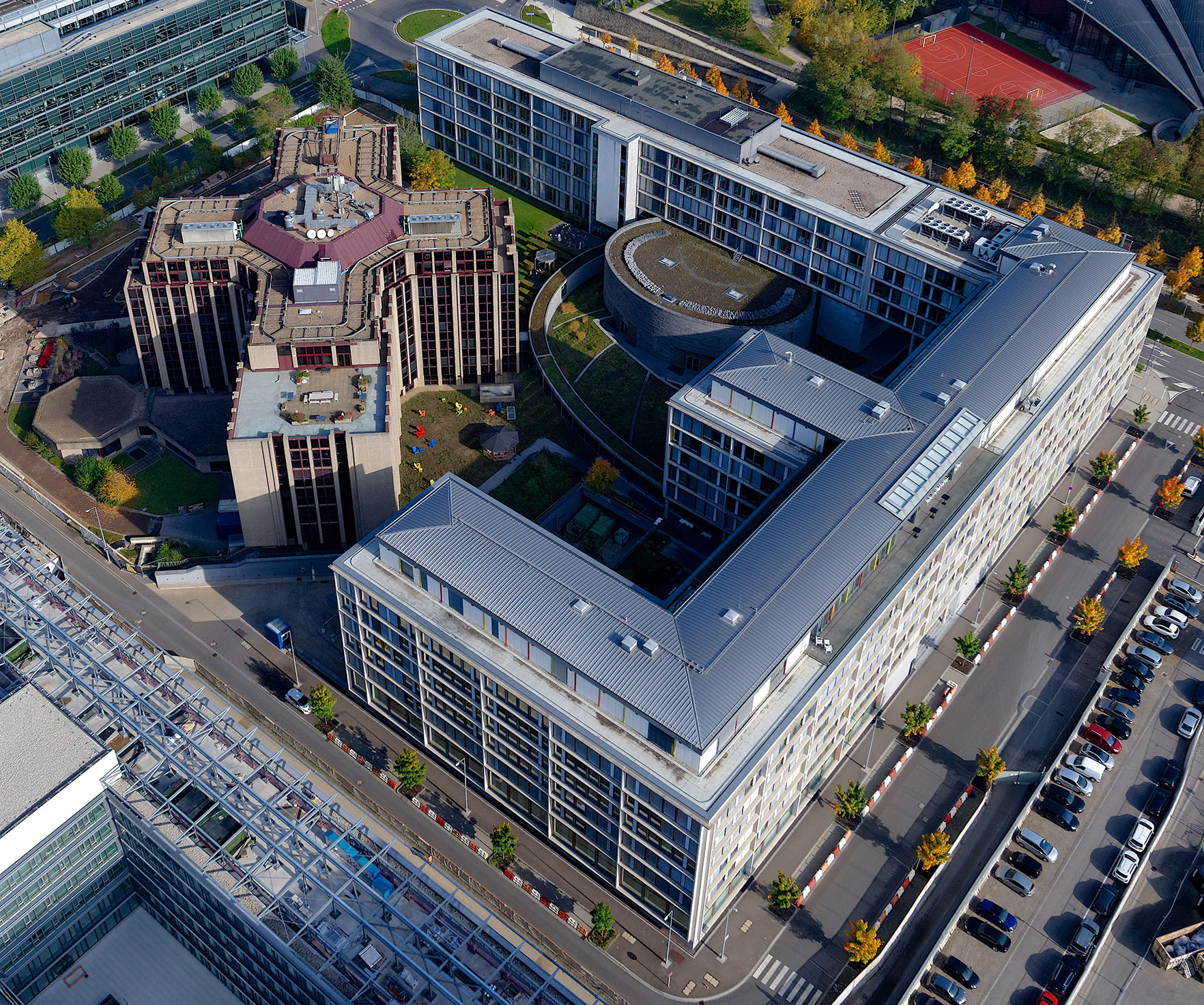
Our accountability
Financial information
Our institution is financed by the general budget of the European Union as administrative expenditure.
In 2017, our budget amounted to around €141 million. This represents less than 0.1 % of total EU spending or around 1.5 % of EU’s total administrative spending. The proportion of the 2017 budget used was 98 %.
| 2017 FINANCIAL YEAR | Final appropriations | Commitments | % use | Payments |
|---|---|---|---|---|
| Title 1: People working with the institution | (thousand euros) | |||
| 10 — Members of the institution | 11 200 | 10 672 | 95 % | 10 598 |
| 12 — Officials and temporary staff | 102 470 | 101 088 | 99 % | 101 010 |
| 14 — Other staff and external services | 5 716 | 5 464 | 96 % | 5 333 |
| 162 — Missions | 3 450 | 3 035 | 88 % | 2 575 |
| 161 + 163 + 165 — Other expenditure relating to persons working for the institution | 2 775 | 2 530 | 91 % | 1 901 |
| Subtotal Title 1 | 125 611 | 122 789 | 98 % | 121 417 |
| Title 2: Buildings, movable property, equipment and miscellaneous operating expenditure | ||||
| 20 — Immovable property | 3 546 | 3 541 | 99 % | 1 669 |
| 210 — IT&T | 8 148 | 8 148 | 100 % | 4 563 |
| 212 + 214 + 216 — Movable property and associated costs | 999 | 942 | 94 % | 736 |
| 23 — Current administrative expenditure | 434 | 293 | 68 % | 221 |
| 25 — Meetings, conferences | 733 | 664 | 91 % | 443 |
| 27 — Information and publishing | 1 769 | 1 663 | 94 % | 1 082 |
| Subtotal Title 2 | 15 629 | 15 251 | 98 % | 8 714 |
| Total | 141 240 | 138 040 | 98 % | 130 131 |
Budget for 2018
The 2018 budget is 3.4 % higher than in 2017.
| BUDGET | 2018 | 2017 |
|---|---|---|
| Title 1: People working with the institution | (thousand euros) | |
| 10 — Members of the institution | 12 515 | 11 300 |
| 12 — Officials and temporary staff | 106 600 | 103 632 |
| 14 — Other staff and external services | 5 745 | 5 101 |
| 162 — Missions | 3 450 | 3 450 |
| 161 + 163 + 165 — Other expenditure relating to persons working for the institution | 2 990 | 2 788 |
| Subtotal Title 1 | 131 300 | 126 271 |
| Title 2: Buildings, movable property, equipment and miscellaneous operating expenditure | ||
| 20 — Immovable property | 2 930 | 3 216 |
| 210 — IT&T | 7 492 | 7 408 |
| 212 + 214 + 216 — Movable property and associated costs | 1 157 | 925 |
| 23 — Current administrative expenditure | 555 | 438 |
| 25 — Meetings, conferences | 706 | 676 |
| 27 — Information and publishing | 1 876 | 2 306 |
| Subtotal Title 2 | 14 716 | 14 969 |
| Total | 146 016 | 141 240 |
Risk management
During the year, as required by the Financial Regulation, we reviewed the risk assessments made for each Directorate. The results of these checks feed into the authorising officer’s annual declaration in the annual activity report, as well as the following year’s risk assessments. Where required, we drew up action plans in relation to both ex ante and ex post checks.
In September 2017, and following these reviews, we have reinforced the internal controls and financial procedures in relation to travel expenses and the management of official vehicles.
Internal and external audit
Internal audit
Our Internal Audit Service (IAS) advises our institution on how to manage risks. It issues opinions on the quality of management and internal control systems. The IAS reports to an audit committee composed of three of our Members and an external expert. The committee regularly monitors the progress of the various tasks set out in the IAS’s annual work programme and ensures its independence.
In 2017, the IAS examined the implementation of our 2013-2017 strategy, the operational structure of the Directorate of Presidency and the management of our software licences and products. It also reviewed the implementation of our risk management policy and monitored the implementation of its recommendations, ensuring that the action plans were implemented.
The internal auditor considers that, in 2017, the governance, risk management and internal control procedures in place, taken as a whole, provide reasonable assurance as to the achievement of the Court’s objectives.
We report to the Parliament and the Council every year on the results of our internal audit activity.
External audit
Our annual accounts are audited by an independent external auditor. This is as an important aspect of our institution applying the same principles of transparency and accountability to ourselves as we do to our auditees. Our external auditor — PricewaterhouseCoopers Sàrl — published its report on our accounts for the 2016 financial year on 31 October 2017.
Discharge
Like all other EU institutions, we are subject to the discharge process.
In April 2017, the European Parliament granted our Secretary-General discharge in respect of the implementation of our budget for the 2015 financial year. This means that our accounts for 2015 were cleared (i.e. closed and approved).
As we do every year, we have carefully analysed all issues raised during the discharge exercise regarding our audit and management responsibilities, taken appropriate action and reported on our follow-up actions to the European Parliament.
Opinions of our external auditor — 2016 financial year
Regarding our financial statements:
‘In our opinion, the financial statements give a true and fair view of the financial position of the European Court of Auditors as of 31 December 2016, and of its financial performance, its cash flows and the changes in net assets for the year then ended in accordance with the Regulation (EU, Euratom) No 966/2012 of the European Parliament and of the Council of 25 October 2012 on the financial rules applicable to the general budget of the Union and repealing Council Regulation (EC, Euratom) No 1605/2002 (OJ L 298, 26.10.2012, p. 1), hereinafter referred to as ‘the Financial Regulation’; and with the Commission Delegated Regulation (EU) No 1268/2012 of 29 October 2012 on the rules of application of the Financial Regulation.’
Regarding our use of resources and control procedures:
‘Based on our work described in this report, nothing has come to our attention that causes us to believe that in all material respects and based on the criteria described above:
- the resources assigned to the ECA have not been used for their intended purposes;
- the control procedures in place do not provide the necessary guarantees to ensure the compliance of financial operations with the applicable rules and regulations.’
Declaration by the authorising officer by delegation
I, the undersigned, Secretary-General of the European Court of Auditors, in my capacity as authorising officer by delegation, hereby:
- declare that the information contained in this report is true and accurate; and
- state that I have reasonable assurance that:
- the resources assigned to the activities described in this report have been used for their intended purpose and in accordance with the principles of sound financial management; and
- the control procedures in place provide the necessary guarantees concerning the legality and regularity of the transactions underlying the accounts and ensure an adequate treatment of allegations of fraud, or suspected fraud; and
- the costs and benefits of controls are proportionate.
This assurance is based on my judgment and on the information at my disposal, such as the reports and declarations of the authorising officers by sub-delegation, the reports of the internal auditor and the reports of the external auditor for previous financial years.
I confirm that I am not aware of anything not reported here which could be detrimental to the interests of the institution.
Done at Luxembourg, 8 March 2018

Eduardo Ruiz García
Secretary-General
Annex — Publications in 2017: special reports, opinions and review-based publications
Special reports
- Special report 30/2016: The effectiveness of EU support to priority sectors in Honduras
- Special report 33/2016: Union Civil Protection Mechanism: the coordination of responses to disasters outside the EU has been broadly effective
- Special report 34/2016: Combatting Food Waste: an opportunity for the EU to improve the resource-efficiency of the food supply chain
- Special report 35/2016: The use of budget support to improve domestic revenue mobilisation in sub-Saharan Africa
- Special report 36/2016: An assessment of the arrangements for closure of the 2007-2013 cohesion and rural development programmes
- Special report 1/2017: More efforts needed to implement the Natura 2000 network to its full potential
- Special report 2/2017: The Commission’s negotiation of 2014-2020 Partnership Agreements and programmes in Cohesion: spending more targeted on Europe 2020 priorities, but increasingly complex arrangements to measure performance
- Special report 3/2017: EU Assistance to Tunisia
- Special report 4/2017: Protecting the EU budget from irregular spending: The Commission made increasing use of preventive measures and financial corrections in Cohesion during the 2007-2013 period
- Special report 5/2017: Youth unemployment – have EU policies made a difference?
- Special report 6/2017: EU response to the refugee crisis: the ‘hotspot’ approach
- Special report 7/2017: The certification bodies’ new role on CAP expenditure: a positive step towards a single audit model but with significant weaknesses to be addressed
- Special report 8/2017: EU fisheries controls: more efforts needed
- Special report 9/2017: EU support to fight human trafficking in South/South-East Asia
- Special report 10/2017: EU support to young farmers should be better targeted to foster effective generational renewal
- Special report 11/2017: The Bêkou EU trust fund for the Central African Republic: a hopeful beginning despite some shortcomings
- Special report 12/2017: Implementing the Drinking Water Directive: water quality and access to it improved in Bulgaria, Hungary and Romania, but investment needs remain substantial
- Special report 13/2017: A single European rail traffic management system: will the political choice ever become reality?
- Special report 14/2017: Performance review of case management at the Court of Justice of the European Union
- Special report 15/2017: Ex ante conditionalities and performance reserve in Cohesion: innovative but not yet effective instruments
- Special report 16/2017: Rural Development Programming: less complexity and more focus on results needed
- Special report 17/2017: The Commission’s intervention in the Greek financial crisis
- Special report 18/2017: Single European Sky: a changed culture but not a single sky
- Special report 19/2017: Import procedures: shortcomings in the legal framework and an ineffective implementation impact the financial interests of the EU
- Special report 20/2017: EU-funded loan guarantee instruments: positive results but better targeting of beneficiaries and coordination with national schemes needed
- Special report 21/2017: Greening: a more complex income support scheme, not yet environmentally effective
- Special report 22/2017: Election Observation Missions – efforts made to follow up recommendations but better monitoring needed
- Special report 23/2017: Single Resolution Board: Work on a challenging Banking Union task started, but still a long way to go
Opinions
- Opinion 1/2017 on a proposal for a revision of the ‘Financial Regulation’ applicable to the EU general budget
- Opinion 2/2017 on a proposal for amending the Financial Regulation applicable to the budget of the European Schools
- Opinions 3/2017 and 4/2017 on proposals to amend Regulations of the Budget Committee of the European Union Intellectual Property Office
- Opinion 5/2017 on a proposal for a regulation of the European Parliament and of the Council on the statue and funding of European political parties and foundations
Review-based publications
- Landscape Review: EU action on energy and climate change
- Rapid case review on the implementation of the 5 % reduction of staff posts
* This designation is without prejudice to positions on status, and is in line with UNSCR 1244 and the ICJ Opinion on the Kosovo Declaration of Independence.
* In 2017, the reviewers assessed our special reports 3/2017, 4/2017, 5/2017, 10/2017, 14/2017, 17/2017.
Contact
EUROPEAN COURT OF AUDITORS
12, rue Alcide De Gasperi
1615 Luxembourg
LUXEMBOURG
Tel. +352 4398-1
Enquiries: eca.europa.eu/en/Pages/ContactForm.aspx
Website: eca.europa.eu
Twitter: @EUAuditors
More information on the European Union is available on the internet (http://europa.eu).
Luxembourg: Publications Office of the European Union, 2018
| ISBN 978-92-872-9669-6 | ISSN 1684-0739 | doi:10.2865/0093 | QJ-AA-18-001-EN-C | |
| ISBN 978-92-872-9626-9 | ISSN 2315-3938 | doi:10.2865/403472 | QJ-AA-18-001-EN-N | |
| HTML | ISBN 978-92-872-9442-5 | ISSN 2315-3938 | doi:10.2865/274195 | QJ-AA-18-001-EN-Q |
© European Union, 2018
Reproduction is authorised provided the source is acknowledged.
For any use or reproduction of the following photos, permission must be sought directly from the copyright holders:
* © Grzegorz Jakubowski / KPRP
* © marianorajoy
For the following photos, reproduction is authorised provided the copyright holder, the source and the name of the photographers are mentioned:
* © European Union; Source: ECA — Simon SCHMITT
* © European Union, 2017; Source: EP — Dominique HOMMEL
* © European Union, 2017; Source: EP — Dominique HOMMEL
* © European Union, 2017; Source: EP — Christian CREUTZ
* © European Union, 2012; Source: EP — Martin LAHOUSSE
* © European Union, 2013; Source: EP — Genevieve ENGEL
* © European Union, 2012; Source: EP — Milos BICANSKI
* © European Union, 2018; Source: EP — Christian CREUTZ
* © European Union, 2017; Source: EP — Mathieu CUGNOT
* © European Union; Source: ECA — Edouard DIRRIG
* © European Union; Source: ECA — Simon SCHMITT
This publication is available in 23 languages and in the following format:
PDFHOW TO OBTAIN EU PUBLICATIONS
Free publications:
- one copy:
- via EU Bookshop (http://bookshop.europa.eu);
- more than one copy or posters/maps:
- from the European Union’s representations (http://ec.europa.eu/represent_en.htm);
- from the delegations in non-EU countries (http://eeas.europa.eu/delegations/index_en.htm);
- by contacting the Europe Direct service (http://europa.eu/europedirect/index_en.htm) or
- calling 00 800 6 7 8 9 10 11 (freephone number from anywhere in the EU) (*).
Priced publications:
- via EU Bookshop (http://bookshop.europa.eu).
